Joe Velikovsky's Blog, page 16
April 18, 2020
That's Interesting! (Davis 1971)
That's Interesting! (Davis 1971)
---------------

So, do you know about this-? (If not you should; it's: interesting!)
Here's an online summary of it... (but then, so is this post you're already reading...)
Davis (1971) says:
Davis (1971) first sets aside certain categories of the interesting:
And, in short(er), they: attack/overturn/disrupt the worldview of the reader/audience... (!)
They are (that great buzzword, that I first encountered via consulting with Deloitte Consulting, when working on a new Augmented Reality Viseogames hardware/software system back in 2004/5):
...Disruptive Technology...!

Davis notes that a lot of research is presented as interesting, due to the following format:
[...You shouldn't take it for granite that I don't know, the phrase is, really: But I digress...]
Now we're getting to the knob of it all:
Here's the selection criteria used by Davis (1971), and I like it.
Davis (1971) presents: [and in the article, he also provides examples]
...What a great Typology / Taxonomy, Davis (1971) has created there...!
In short, he shows how:
Davis also distinguishes between: the Traditional Assumption, the Contemporary Assumption, and the Vanguard Assumption.
This point below (in the article's Endnotes) is interesting for would-be creatives:
... At any rate, I found "That's Interesting!" (Davis 1971) to be most: interesting...!
...Nice classic style writing too! e.g. "the fault in our stars" (Shakespeare) reworking that he did. (Clever!) Also, I really like his: "past, present, or prophetic" poetry...
Also; this bit below reminds me of The Robo-Raconteur...
`Qualitative correlations are more likely to be interesting than quantitative correlations because the human mind, unlike the computer, is programmed (in various degrees of clarity) with the additional rule for the construction of interesting propositions described in this paper. This additional step in one's mental program between conception and assertion serves as a filter to screen out (censor) those correlative propositions that are not worth saying.'
(i.e. The Robo-Raconteur uses a "scoring system" to rate/rank/`judge' the best solutions (movie premises), and thus filter out all the lower-scoring ones...)

And I really like this end-flourish too; after setting up the importance of the "So what/Who cares?" in the sociology of the interesting, he ends the paper on a cool gag:
...And, that (the `genius' thing, there) reminds me of The 5-C Model of Creativity .

...All of which, is: interesting! *

*Well, if you like that kind of thing.
--------------
PS - I heard about That's Interesting! (Davis 1971) when listening to this Sam Harris podcast with Gad Saad.
MAKING SENSE #47 - THE FRONTIERS OF POLITICAL CORRECTNESS - A Conversation with Gad Saad
-----------------------------
You have been reading/viewing a blog-post by:
Dr J T Velikovsky
AI Researcher & Enthusiast... & Evolutionary Culturologist & Filmmaker & Writer & Artist & Actor & Muso & Random Guy
(and, also The StoryAlity Guy)
aka Humanimal
Transmedia Blog: On Writering
IMDb (Movies, Videogames): Music: Texas Radio & Zen StupidityYoutube channel: https://www.youtube.com/joeteevee (over 100 videos, some are even: good)
Academia page: https://newcastle-au.academia.edu/JTVelikovsky
Researchgate page: https://www.researchgate.net/profile/Jt_Velikovsky
My ouvre...
etc etc.
For more, see On Writering and StoryAlity News
---------------------------------------------------------------------------
PPS - And; no, you shouldn't take it for granite that I am a Rick & Morty fan.

(Though I am.)
---------------

So, do you know about this-? (If not you should; it's: interesting!)
That's Interesting! Towards a Phenomenology of Sociology and a Sociology of Phenomenology, Murray S. Davis in Phil. Soc. Sci. 1 (1971, pp. 309-344)It's about: The Sociology of the Interesting...
Here's an online summary of it... (but then, so is this post you're already reading...)
Davis (1971) says:
"It has long been thought that a theorist is considered great because his theories are true,Note the below quote from Davis (1971), in the light of Dawkin's meme theory from The Selfish Gene (1976):
but this is false. A theorist is considered great, not because his theories are true, but because they are interesting."
`Students who follow to the letter all of the injunctions of current textbooks on theory construction, but take into account no other criterion in the construction of their theories, will turn out work that will be found dull indeed. Their impeccably constructed theories will go unnoted — or, more precisely, unfootnoted — by others. But should these students also take into account that criterion, to be detailed below, that distinguishes interesting theories from uninteresting theories, they will find that their theories will make their readers literally sit up and take notice. Their theories will then be discussed among colleagues, examined in journals, confirmed or denied in dissertations, and taught to students as the most recent instances of progress in their profession.'
(Davis 1971, bold emphasis mine)...Here's an excerpt of Dawkins (The Selfish Gene, 1976) on memes:
`Examples of memes are tunes, ideas, catch-phrases, clothes fashions, ways of making pots or of building arches. Just as genes propagate themselves in the gene pool by leaping from body to body via sperms or eggs, so memes propagate themselves in the meme pool by leaping from brain to brain via a process which, in the broad sense, can be called imitation. If a scientist hears, or reads about, a good idea, he passes it on to his colleagues and students. He mentions it in his articles and his lectures. If the idea catches on, it can be said to propagate itself, spreading from brain to brain.'
(Dawkins 1976, p. 192, bold emphasis mine)This interestingness- (or even: fascinatingness-) factor of units of culture / `memes' (words, sentences, catchphrases, cliches, etc) partly explains why some viral memes (units of culture, ideas, scientific models, etc.) are memes...
Davis (1971) first sets aside certain categories of the interesting:
`I will not be dealing with (1) findings, which confirm or disconfirm hypotheses, (2) clues, which indicate the way a problem can be solved, (3) aesthetic descriptions, which refine perception, (4) analogies, which render the unfamiliar in terms of the familiar, and (5) models, which simplify the integration of complex relationships.'In a nutshell, (specifically, discussing social theories) Davis suggests:
`...a new theory will be noticed only when it denies an old truth (proverb, platitude, maxim, adage, saying, commonplace, etc.).'
And, in short(er), they: attack/overturn/disrupt the worldview of the reader/audience... (!)
They are (that great buzzword, that I first encountered via consulting with Deloitte Consulting, when working on a new Augmented Reality Viseogames hardware/software system back in 2004/5):
...Disruptive Technology...!

Davis notes that a lot of research is presented as interesting, due to the following format:
`The standard form of the books and articles about this research is the following:
(1) The author articulates the taken-for-granted assumptions of his imagined audience by reviewing the literature of the particular sub-tradition in question ("It has long been thought . . .").
(2) He adduces one or more propositions that deny what has been traditionally assumed ("But this is false . . .")
(3) He spends the body of the work proving by various methodological devices that the old routinely assumed propositions are wrong while the new ones he has asserted are right ("We have seen instead that . . .").
(4) In conclusion, he suggests the practical consequences of these new propositions for his imagined audience's on-going social research, specifically how they ought to deflect research onto new paths (Further investigation is necessary to . . .).'Of course, this `argument-structure' is reflected in most PhD dissertations - the compressed version of what a PhD study is, is the following algorithm:
1. What do we already know? (i.e., A Prior-Literature Review/Summary)
2. What do I now know? (This new study - focused, by a Research Question/s)
3. What does this mean? (i.e., So what? Does this change anything/everything?)And finally:
4. Which Philosophical Question(s) does this lead back to?(Side Note: For this reason, I also suggest, #4 above is the answer to the unsolved problem of What is the Theme of the work? within the study of: literature/fiction/songs, etc... But I digest.)
[...You shouldn't take it for granite that I don't know, the phrase is, really: But I digress...]
Now we're getting to the knob of it all:
Here's the selection criteria used by Davis (1971), and I like it.
`For the purposes of this investigation, I considered a social theory to be interesting if it has been in wide circulation. Wide circulation here is meant to encompass both those social theories that have been considered interesting in times past and those that have been considered interesting recently — that is, those that were and those that are in the air. (The former are now usually taught to students in introductory courses; the latter in substantive courses beyond the introductory level.)'This all reminds me of my PhD (from 2016). ...It's what I did, in looking at: the popular works of `How-To' Screenwriting Manuals for writing Movies. But I digest.
Davis (1971) presents: [and in the article, he also provides examples]
`The Species of Interesting Propositions...
A — The Characterization of a single phenomenon:
(i) Organization
a. What seems to be a disorganized (unstructured) phenomenon is in reality an organized
(structured) phenomenon.
b. What seems to be an organized (structured) phenomenon is in reality a disorganized
(unstructured) phenomenon.
(ii) Composition
a. What seem to be assorted heterogeneous phenomena are in reality composed of a single element.
b. What seems to be a single phenomenon is in reality composed of assorted heterogeneous elements.
(iii) Abstraction
a. What seems to be an individual phenomenon is in reality a holistic phenomenon.
b. What seems to be a holistic phenomenon is in reality an individual phenomenon.
(iv) Generalization
a. What seems to be a local phenomenon is in reality a general phenomenon.
b. What seems to be a general phenomenon is in reality a local phenomenon.
(v) Stabilization
a. What seems to be a stable and unchanging phenomenon is in reality an unstable and changing phenomenon.
b. What seems to be an unstable and changing phenomenon is in reality a stable and unchanging phenomenon.
(vi) Function
a. What seems to be a phenomenon that functions ineffectively as a means for the attainment of an end is in reality a phenomenon that functions effectively.
b. What seems to be a phenomenon that functions effectively as a means for the attainment of an end is in reality a phenomenon that functions ineffectively.
(vii) Evaluation
a. What seems to be a bad phenomenon is in reality a good phenomenon.
b. What seems to be a good phenomenon is in reality a bad phenomenon.
B — The Relations Among Multiple Phenomena
(viii) Co-relation
a. What seem to be unrelated (independent) phenomena are in reality correlated
(interdependent) phenomena.
b. What seem to be related (interdependent) phenomena are in reality uncorrelated (independent) phenomena.
(ix) Co-existence
a. What seem to be phenomena that can exist together are in reality phenomena that cannot exist together.
b. What seem to be phenomena that cannot exist together are in reality phenomena that can exist together.
(x) Co-variation
a. What seems to be a positive co-variation between phenomena is in reality a negative co-variation between phenomena.
b. What seems to be a negative co-variation between phenomena is in reality a positive co-variation between phenomena.
(xi) Opposition
a. What seem to be similar (nearly identical) phenomena are in reality opposite phenomena.
b. What seem to be opposite phenomena are in reality similar (nearly identical) phenomena.
(xii) Causation
a. What seems to be the independent phenomenon (variable) in a causal relation is in reality the dependent phenomenon (variable).
b. What seems to be the dependent phenomenon (variable) in a causal relation is in reality the independent phenomenon (variable).
...What a great Typology / Taxonomy, Davis (1971) has created there...!
In short, he shows how:
`...an audience finds a proposition interesting not because it tells them some truth they did not already know, but instead because it tells them some truth they thought they already knew was wrong.'I like this, too:
`It should be clear from the above discussion that those who lack what is called "the creative spark" are in fact those who fail to take into account the assumption-grounds of their audiences.'At the same time he warns that if you present something: (1) obvious, (2) irrelevant, or (3) absurd (the latter, denying an entire worldview, not just an assumption within a worldview) it will be found: uninteresting.
Davis also distinguishes between: the Traditional Assumption, the Contemporary Assumption, and the Vanguard Assumption.
This point below (in the article's Endnotes) is interesting for would-be creatives:
`2. The quality of being imaginative, which interesting theorists are praised for possessing, consists less of their ability to imagine inventively something novel than of their ability to imagine empathetically what others consider to be traditional.' [And then deny / refute something, in these `traditional' assumptions... - JTV]And this one, for those writing a Masters or a PhD:
`5. Although it might be thought that the "review of the literature" section of research articles and books serves this function, in most cases it does not do so adequately. Most social researchers do not clearly understand that the purpose of their review of the literature is to articulate the assumptions of their audience, and not merely to fulfil a rhetorical ritual. Nor do they clearly understand that the purpose of the rest of their research presentation is to increase our interest by refuting these assumptions, and not merely to "increase our knowledge" by confirming or ignoring them.'
... At any rate, I found "That's Interesting!" (Davis 1971) to be most: interesting...!
...Nice classic style writing too! e.g. "the fault in our stars" (Shakespeare) reworking that he did. (Clever!) Also, I really like his: "past, present, or prophetic" poetry...
Also; this bit below reminds me of The Robo-Raconteur...
`Qualitative correlations are more likely to be interesting than quantitative correlations because the human mind, unlike the computer, is programmed (in various degrees of clarity) with the additional rule for the construction of interesting propositions described in this paper. This additional step in one's mental program between conception and assertion serves as a filter to screen out (censor) those correlative propositions that are not worth saying.'
(i.e. The Robo-Raconteur uses a "scoring system" to rate/rank/`judge' the best solutions (movie premises), and thus filter out all the lower-scoring ones...)

And I really like this end-flourish too; after setting up the importance of the "So what/Who cares?" in the sociology of the interesting, he ends the paper on a cool gag:
`This report should be regarded as an introductory investigation of that residual category of 'genius' that separates the great theorists from the mediocre.
So what? Who cares?'
...And, that (the `genius' thing, there) reminds me of The 5-C Model of Creativity .

...All of which, is: interesting! *

*Well, if you like that kind of thing.
--------------
PS - I heard about That's Interesting! (Davis 1971) when listening to this Sam Harris podcast with Gad Saad.
MAKING SENSE #47 - THE FRONTIERS OF POLITICAL CORRECTNESS - A Conversation with Gad Saad
-----------------------------
You have been reading/viewing a blog-post by:
Dr J T Velikovsky
AI Researcher & Enthusiast... & Evolutionary Culturologist & Filmmaker & Writer & Artist & Actor & Muso & Random Guy
(and, also The StoryAlity Guy)
aka Humanimal
Transmedia Blog: On Writering
IMDb (Movies, Videogames): Music: Texas Radio & Zen StupidityYoutube channel: https://www.youtube.com/joeteevee (over 100 videos, some are even: good)
Academia page: https://newcastle-au.academia.edu/JTVelikovsky
Researchgate page: https://www.researchgate.net/profile/Jt_Velikovsky
My ouvre...
etc etc.
For more, see On Writering and StoryAlity News
---------------------------------------------------------------------------
PPS - And; no, you shouldn't take it for granite that I am a Rick & Morty fan.

(Though I am.)
Published on April 18, 2020 10:38
February 19, 2020
Data, Info, Knowledge, Intelligence (and its Antithesis)
Data, Info, Knowledge, Intelligence
You may be familiar with this diagram:

But there's also: DIKUW...
 And I do like this one:
And I do like this one:

See: this article.
--------------------
Further Reading , if you like that kind of thing:
Wikipedia on the DIKW pyramid
The Problem with the Data-Information-Knowledge-Wisdom Hierarchy (Weinberger 02010, HBR)
The Circle of Data, Information, Knowledge, Understanding, and Wisdom (Jiang 2016)
Bloom's Taxonomy
The Data-Information-Knowledge-Wisdom Hierarchy and its Antithesis (Bernstein 2009)
Bernstein, J. H. (2009). The data-information-knowledge-wisdom hierarchy and its antithesis. In Jacob, E. K. and Kwasnik, B. (Eds.). (2009). Proceedings North American Symposium on Knowledge Organization Vol. 2, Syracuse, NY, pp. 68-75.
This last one is funny. It results in this:

...Not sure why, but the above diagram reminds me of Donald Trump, and all his supporters...?
-----------------------------
You have been reading/viewing a blog-post by:
Dr J T Velikovsky
AI Researcher & Enthusiast... & Evolutionary Culturologist & Filmmaker & Writer & Artist & Actor & Muso & Random Guy
(and, also The StoryAlity Guy)
aka Humanimal
Transmedia Blog: On Writering
IMDb (Movies, Videogames): Music: Texas Radio & Zen StupidityYoutube channel: https://www.youtube.com/joeteevee (over 100 videos, some are even: good)
Academia page: https://newcastle-au.academia.edu/JTVelikovsky
Researchgate page: https://www.researchgate.net/profile/Jt_Velikovsky
My ouvre...
etc etc.
For more, see On Writering and StoryAlity News
---------------------------------------------------------------------------
You may be familiar with this diagram:

But there's also: DIKUW...
 And I do like this one:
And I do like this one:
See: this article.
--------------------
Further Reading , if you like that kind of thing:
Wikipedia on the DIKW pyramid
The Problem with the Data-Information-Knowledge-Wisdom Hierarchy (Weinberger 02010, HBR)
The Circle of Data, Information, Knowledge, Understanding, and Wisdom (Jiang 2016)
Bloom's Taxonomy
The Data-Information-Knowledge-Wisdom Hierarchy and its Antithesis (Bernstein 2009)
Bernstein, J. H. (2009). The data-information-knowledge-wisdom hierarchy and its antithesis. In Jacob, E. K. and Kwasnik, B. (Eds.). (2009). Proceedings North American Symposium on Knowledge Organization Vol. 2, Syracuse, NY, pp. 68-75.
This last one is funny. It results in this:

...Not sure why, but the above diagram reminds me of Donald Trump, and all his supporters...?
-----------------------------
You have been reading/viewing a blog-post by:
Dr J T Velikovsky
AI Researcher & Enthusiast... & Evolutionary Culturologist & Filmmaker & Writer & Artist & Actor & Muso & Random Guy
(and, also The StoryAlity Guy)
aka Humanimal
Transmedia Blog: On Writering
IMDb (Movies, Videogames): Music: Texas Radio & Zen StupidityYoutube channel: https://www.youtube.com/joeteevee (over 100 videos, some are even: good)
Academia page: https://newcastle-au.academia.edu/JTVelikovsky
Researchgate page: https://www.researchgate.net/profile/Jt_Velikovsky
My ouvre...
etc etc.
For more, see On Writering and StoryAlity News
---------------------------------------------------------------------------
Published on February 19, 2020 12:07
February 13, 2020
4 kinds of chance (or `luck') in creativity
On 4 kinds of chance (or `luck') in creativity...

Creativity researchers Hayes (1989) and also Austin (1978) said some interesting things about luck, in creativity...
Here's an excerpt from an early draft of my 2016 Ph.D. (that didn't make the cut, at 100,000 words max!)
-------------------
REFERENCES
And, see: Chase, Chance, and Creativity: The Lucky Art of Novelty (Austin 1978, 2003)
So, anyway -
4 kinds of luck!

Load those dice, and use them: well!
PS - Here's a quote, that did make the cut, in my PhD
(see p. 117 of the StoryAlity thesis):
De Vany, A. S. (2004). Hollywood Economics: How Extreme Uncertainty Shapes The Film Industry. London; New York: Routledge.
Anyway; see my PhD (& the StoryAlity PhD-blog) for vastly more detail.

-----------------------------
You have been reading/viewing a blog-post by:
Dr J T Velikovsky
AI Researcher & Enthusiast... & Evolutionary Culturologist & Filmmaker & Writer & Artist & Actor & Muso & Random Guy
(and, also The StoryAlity Guy)
aka Humanimal
Transmedia Blog: On Writering
IMDb (Movies, Videogames): Music: Texas Radio & Zen StupidityYoutube channel: https://www.youtube.com/joeteevee (over 100 videos, some are even: good)
Academia page: https://newcastle-au.academia.edu/JTVelikovsky
Researchgate page: https://www.researchgate.net/profile/Jt_Velikovsky
My ouvre...
etc etc.
For more, see On Writering and StoryAlity News
---------------------------------------------------------------------------
PPS
If you can't remember the 7 x P's of creativity, they are:
...when scholars and researchers and scientists study creativity – from one perspective (derived from Rhodes 1962) – they examine the 7 P’s of creativity; namely:the creative person(ality) – their personality, character, traits, values, etc… ie Who are (or: were) they? What were they like?their creative potential (e.g. their talents, genetic / biological / psychological predispositions, etc. e.g. Did they display interest and/or aptitude at a young age, in the area in which they later were recognized as: creative?)their: creative process(es) (e.g. their cognition, their working methods, their techniques, strategies, work habits, etc)their creative product(s) – e.g. their: invention, or artwork, or novel, or movie, musical composition, or scientific theory or discovery, etctheir (creative) place – e.g. geographical, temporal, socio-cultural environment, social networks, etctheir creative persuasion (how did the Field become convinced that their product was indeed, creative? – i.e., new and useful? Or even: new, useful and surprising?)their creative press – (the many and various influences on the creative person’s behaviour…)See: What is creativity?

Creativity researchers Hayes (1989) and also Austin (1978) said some interesting things about luck, in creativity...
Here's an excerpt from an early draft of my 2016 Ph.D. (that didn't make the cut, at 100,000 words max!)
"`Graeme Mason, chief executive (2013-present) of government film funding body Screen Australia states:
`Australian films by their nature – creatively and size – are art-house. They’re appealing to a smaller demographic. We don’t have the budgets. We’re not going to make Thoror The Hobbit… There is no room to fail any longer. The specialty audience has had so many opportunities that are so much cheaper. You have to nail it. We need reviewers in your paper to give it five stars. We need reviewers to be saying `This is bleak but this is one you have to see.’ We need your friends to be telling you to go see it. You can no longer get four-star reviews and `This is a good first attempt’. It has to be five stars.’ (Maddox 2014)
Paraphrased, Mason above is essentially saying: You really need your film to go viral, or it’s curtains. The above quote applies in a general sense to the Australian movie industry, but the point extends deeper into the international cinema domain.
Given also that culture and domain-knowledge evolves, there are also circumstances constantly occurring in the context within which filmmakers are operating (e.g.: in the film industry) of which, they can have no control, let alone, knowledge or awareness.
For example, as a screenwriter, unless we know every single film producer in the field, we may not know, who exactly is looking for which exact type (or say, genre, and budget range) of screenplay, and, at which exact particular and specific point in (or, window of) time.
Despite annual industry personnel (hard-copy) directories such as Encore, this kind of information is certainly not standardized, formally organized, or presented comprehensively anywhere within the complex system of the film field and domain.
That specific information largely is shared, (or alternately: deliberately guarded, and sometimes, not shared) via word-of-mouth, and certain social networks (rarely however via electronic social networks, as producers generally wish to avoid being `bombarded’ by an onslaught of amateur, sub-par screenplays, for example). As Alexander (2003) notes of the industry: `vacancies are not advertised’ (Alexander 2003, p. 154).
With regard to screenplays, this means persuasion(one of "the 7 P's" in the study of creativity) is crucial; the movie story itself must persuade investors/financiers that the film should be made, over all competing projects.
In short, the environment - and the ecosystem- of filmmaking (and of each creative cultural domain within it) is somewhat like a `jungle’, and therefore, a Darwinian “survival of the fittest”
Hayes (1989) also notes that chance (i.e., “luck”) can play a crucial role in genuinely creative acts, citing Austin (1978) on four different kinds of luck in creative acts:
`Austin (1978) makes an interesting distinction among four kinds of chance events.
Chance I is just blind luck. It could happen to anyone and doesn't depend on any special ability of the person it happens to.
In Chance II, luck depends on the person's curiosity or persistence in exploration. The fact that a curious person attends more, say, to the habits of beetles makes that person more likely to discover something interesting about beetles than a person who regards them simply as something to be squashed.
In Chance III, luck depends on the person having extensive knowledge of the field not shared by most people. Thus, the Curies' discovery of radium depended on their recognizing that a certain mineral was more radioactive than it ought to be on the basis of the known elements it contained. Clearly only a very knowledgeable person could make such a discovery. This is the sort of chance that Pasteur was talking about when he said, "... chance favors only the prepared mind."
Finally, in Chance IV, luck depends on the person's particular, and perhaps unique, intellectual style or pattern of interests.
Acts which involve chance events of the last three kinds do reflect credit on the mind of the actor, and thus are potentially creative.’
(Hayes 1989)
In The Creative Personality, (Csikszentmihalyi, Mihaly 1996a) also identified ten antithetical attributes of the creative personalitythat include a curiosity, or a deep interest in, almost everything and anything; Stanley Kubrick (see: Ciment 1999, passim) stands as an example of such an individual, but such traits also appear across the top 20 RoI filmmakers.
Simonton (2004) also examines scientificcreativity, demonstrating that four different elements can come into play with scientific creativity, in Creativity in Science: Chance, Logic, Genius, and Zeitgeist (Simonton 2004).
The current thesis also proposes that these four factors in Scientific creativity (chance, logic, genius, and disciplinary zeitgeist) can also equally play a crucial role in creativity in the Arts (for example, in screenwriting and in film); as will be later shown in this study - the top 20 RoI films demonstrate this, and the bottom 20 RoI films do not."
-------------------
REFERENCES
And, see: Chase, Chance, and Creativity: The Lucky Art of Novelty (Austin 1978, 2003)
So, anyway -
4 kinds of luck!

Load those dice, and use them: well!
PS - Here's a quote, that did make the cut, in my PhD
(see p. 117 of the StoryAlity thesis):
`Marketing can’t change the odds. There is no evidence to show that marketing has much to do with a film’s success. Marketing is mostly defensive anyway; a studio has to market its films draw attention in a field where everyone is shouting. If you don’t shout too, you will be drowned out and may not be noticed.' (De Vany 2004, p. 4).
De Vany, A. S. (2004). Hollywood Economics: How Extreme Uncertainty Shapes The Film Industry. London; New York: Routledge.
Anyway; see my PhD (& the StoryAlity PhD-blog) for vastly more detail.

-----------------------------
You have been reading/viewing a blog-post by:
Dr J T Velikovsky
AI Researcher & Enthusiast... & Evolutionary Culturologist & Filmmaker & Writer & Artist & Actor & Muso & Random Guy
(and, also The StoryAlity Guy)
aka Humanimal
Transmedia Blog: On Writering
IMDb (Movies, Videogames): Music: Texas Radio & Zen StupidityYoutube channel: https://www.youtube.com/joeteevee (over 100 videos, some are even: good)
Academia page: https://newcastle-au.academia.edu/JTVelikovsky
Researchgate page: https://www.researchgate.net/profile/Jt_Velikovsky
My ouvre...
etc etc.
For more, see On Writering and StoryAlity News
---------------------------------------------------------------------------
PPS
If you can't remember the 7 x P's of creativity, they are:
...when scholars and researchers and scientists study creativity – from one perspective (derived from Rhodes 1962) – they examine the 7 P’s of creativity; namely:the creative person(ality) – their personality, character, traits, values, etc… ie Who are (or: were) they? What were they like?their creative potential (e.g. their talents, genetic / biological / psychological predispositions, etc. e.g. Did they display interest and/or aptitude at a young age, in the area in which they later were recognized as: creative?)their: creative process(es) (e.g. their cognition, their working methods, their techniques, strategies, work habits, etc)their creative product(s) – e.g. their: invention, or artwork, or novel, or movie, musical composition, or scientific theory or discovery, etctheir (creative) place – e.g. geographical, temporal, socio-cultural environment, social networks, etctheir creative persuasion (how did the Field become convinced that their product was indeed, creative? – i.e., new and useful? Or even: new, useful and surprising?)their creative press – (the many and various influences on the creative person’s behaviour…)See: What is creativity?
Published on February 13, 2020 11:30
January 8, 2020
Multimedia Showreel - Joe T Velikovsky (January 02020)
Online Multimedia Showreelof
Dr Joe T (aka: J.T.) Velikovsky Ph.D. (aka: JTV)
(Updated: January 02020)

Ph.D. in Communication & Media Arts
 JTV graduates the PhD (02017)
JTV graduates the PhD (02017)

============//=============
So my Short C.V. (2 pages) is here, & my Long C.V. is here. (If, you like that sort of thing...)
& Here's a summary of me, of sorts:
============//=============
& Below are some of my past projects, sorted into the media-categories of:
FILMS / MOVIES / FILMOVIES (i.e. Feature-length)SHORT FILMS (Shorts)VIDEOGAMESCOMPUTER PROGRAMS/SOFTWARETVNOVELSNON-FICTION BOOKSPLAYSSHORT STORIESARTICLES (in: JOURNALS, BOOKS, ENCYCLOPEDIAS, etc)POEMSJOKESSONGSCARTOONS & COMIXPAINTINGSPHOTOGRAPHSINSTALLATION ARTWORKSPh.D.sPROMO VIDEOS
============//============= FILMS / MOVIES / FILMOVIES (Feature-length) (That I've been involved with, in some capacity)
Drumroll...

RUNAWAY CHAINSAW - The 90-minute Comedy Feature-Film (2016)
A (magic) chainsaw gets away from a bloke,and goes on a tour across the countryside.
Visit: http://runaway-chainsaw.blogspot.com.au/
(I was: Writer-Producer-Director-Cameraman-Actor-Editor-Sound- & Continuity-Guy.)
(I wanted to see if one guy could make a Top 20 RoI movie [a movie that makes over 71 times its production budget] in a week. ...Turns out, you can!)
The Short Film version of it (14 mins, as opposed to 90 mins) also won some awards.
-----------/-------------
Also:
 The Jungle
(2013)
The Jungle
(2013)
Big cat conservationist LARRY BLACK and his filmmaker brother BEN travel into the Indonesian jungle to find and document the rare and endangered Javan Leopard. As they travel deeper and deeper into the jungle they realise they are being stalked by a deadly predator.
The Jungle - Trailer
(I had various roles on this film, long story. See the End Credits in the film itself.)
-----------/-------------
 Caught Inside
- Movie Poster
Caught Inside
- Movie Poster
Winner, Audience Award, Sydney Film Festival 2010 Winner, Independent Spirit Award, IF (Independent Film) Awards 2010 SXSW (South By Southwest Film Festival) 2011 - official selection.
Caught Inside (2010) - Trailer
The world's first surf-thriller-horror film (!)
When a tight-knit group of surfers venture to a secluded island paradise on the 'surfari' of their lives, they make the mistake of bringing the one thing that can tear them all apart: a beautiful young woman...! As tensions boil over and friendships fall to the side, a `monster' emerges from within - the most revered and feared amongst them. A monster, who soon turns their "dream vacation" - into a nightmare fight for survival...
"CAUGHT INSIDE: Anyone is a weapon if you twist them right..."
(I was a co-writer on the film.)
-----------/---------------
& some of my spec movie screenplays...
============//=============
SHORT FILMS: Rocket Man
- movie poster
Rocket Man
- movie poster
Rocket Man (1997) (Rated R) (10 mins) (Docu-Drama/Science Fiction)
The incredibly true story of Darwin Edward Cole - "the serial killer who saved the world."
(I was a co-writer on the film.)
-----------/-------------
Retro Sheilas - in - SPACE ALIENS ARE TOOLING OUR SHEIIAS~!!!
(1995) (Comedy - Rated R) (7 mins)
-----------/-------------
Hero (4 min excerpt) (Psychological Horror / Drama) (13 mins)
A lonely man finds a woman's lost mobile phone and sets about rescuing her from violent thugs.
(I was a co-writer on the film. Also did: Continuity, on set.)
-----------/-------------
Short film:
RUNAWAY CHAINSAW ™ in Bathurst - Trailer
RUNAWAY CHAINSAW ™ in Bathurst (Short Film - 14 mins)
See here for more details.
(I was: Writer-Producer-Director-Cameraman-Actor-Production Designer-Editor-Sound-StuntMan, Chainsaw-Puppeteer & Continuity-Guy on the film.)
-----------/------------- Short Film & Full-Length Stageplay:
 Stageplay poster
Stageplay poster
Darwin Down Under (in 1836!) (Historical Comedy)
The story of Charles Darwin's historic visit to Bathurst, NSW, Australia, in 1836.
For more see: the stage play (blog post).This film also won an award.
(I was the Writer, Director, Narrator, Animator, Sound-guy, etc.)
-----------/-------------
Robo-Tato - in... THE ROBOTS are COMING!!! (30 secs)
(I did everything, including strip the Mr Potatohead, but that's not really saying much.)
I also make Art Films, but not always on purpose:
What is it LIKE, to be: a bat? (10 mins)
Attack of the Bin Chickens (ANZCA Conference, 2017)
============//=============
VIDEOGAMES
3-D Augmented-Reality Sky Invaders (A-Rage 2005)
An award-winning Augmented-Reality game: "3-D Sky Invaders" produced by A-Rage Pty Ltd.
(A-Rage - Augmented Reality: Active Game Engine)
 A-Rage game system
A-Rage game system
(I was the Producer-Director-Writer-Game Designer)
(We also published a conference paper in 2005, on this augmented-reality games technology.)
-----------/-------------
Looney Tunes: ACME ARSENAL (Warner Bros 2007) (Console game - sold a million copies, on: PS2, Wii, & XBox360)
-----------/------------
Liferaft Mobile-phone interactive-soap-opera game8 x 1-minute episodes
Watch the 1-min Eps, and decide , over 8 Episodes of the series, if you will Save - or simply `Savour the schadenfreude' - of Shane & Freida, a honeymooning couple stuck on a sinking liferaft...
(I was the Writer & Designer)
============//============
COMPUTER PROGRAMS / SOFTWARES
The Robo-Raconteur (artificial-writer computer-program) - Demo video
For more, see: The Robo-Raconteur (Velikovsky 2017)
-----------/------------
StoryAlity: The Creative Practice Theory (CPT) Agent-Based Model
For more, see: The `Creative Practice Theory’ Agent-Based Model
The Systematizer (How systems work)
============//============
TV
 (Science fiction TV series)
(Science fiction TV series)
(...I've also done a bunch of other TV stuff, I'll put it in here, soon...)
============//============
NOVELS
I wrote a novel called A Meaningless Sequence of Arbitrary Symbols (AM SO AS), in 2011.
 AM SO AS (2011)
AM SO AS (2011)
OSCAR, a disaffected teenager is mentored in the Art of Game Design - by God Himself...But - can he solve the mystery of the Meaningless Sequence of Arbitrary Symbols in time-?
A Satirical Magic-Realist Bangsian Fantasy Coming-of-Age Novel about Videogames, and Everything Else, as Well...(and yes - we're living in a simulated multiverse)by Oscar Velikovsky (no relation)© 252nd November 2088.
Novel & Game Trailer - (40 secs)for the novel `A Meaningless Sequence of Arbitrary Symbols' (aka "The Voice of the Videogame Generation") and - the free videogame "BOOKS KILL PEOPLE".
See the book's website, here.
----------/------------
Also, as of the year 02020, I've got another novel partway written; I'm serializing it in chapters on a blog:

J.B.: ABOVE-TOP-SECRET AGENT PERSON GUYinAdventure #1: “The Case of the Thing with the Thing, and Whatsaname” By: JT Velikovsky© August 12th 02017, and whatever
(And, I have a few other drafts of novels... but, I gotta beat 'em into shape yet.)
============//============
NON-FICTION BOOKS

The Feature Film Screenwriter's Workbook (Velikovsky 1995/2011)
For more info, see here.
And, here.
----------/------------
 The STORYALITY™ Screenwriting Manual
(2013)See: StoryAlity #67 – The STORYALITY™ Screenwriting Manual (2013): out now on Kindle
-------/-----------
The STORYALITY™ Screenwriting Manual
(2013)See: StoryAlity #67 – The STORYALITY™ Screenwriting Manual (2013): out now on Kindle
-------/-----------
I co-edited this book of conference proceedings:

See: StoryAlity #96 – Transmedia Practice: A Collective Approach (2014)
============//============
STAGEPLAYS

The Abercrombie Zombie
A historical comedy play about Ralf Entwhistle and the Ribbon Gang in Bathurst, Australia - in 1830 !
Written by JT Velikovsky
See the website, here.
-------------/--------------
Darwin Down Under

(See above; we already talked about this :)
============//============
SHORT STORIES
Spartacus The Incubus (1994) - Horror-comedy short story, in the anthology Shadows of Life
Roadkill (OPUS Magazine, 1993) - Horror-comedy short story
The Ancient Cities of Tomorrow (365 Tomorrows, 2019) - Science fiction (flash fiction)

...etc...
============//============
ARTICLES (in: JOURNALS, BOOKS, ENCYCLOPEDIAS, etc)
StoryAlity #144 – My article: `The structure of the meme, the unit of culture' (in: The Encyclopedia of Information Science & Technology, Velikovsky 2017)
StoryAlity #151 – My article on Stanley Kubrick, Charles Darwin and Joe Campbell’s monomyth, in The Journal of Genius and Eminence (March 2018)
StoryAlity #136 – 5 articles in Pop Culture in Asia and Oceania (2016)
StoryAlity #132 – The holon/parton structure of the Meme, the unit of culture – and the narreme, or unit of story – book chapter (Velikovsky 2016)
StoryAlity #125 – My article on Nia Vardalos, in Women Screenwriters: An International Guide (2015)
StoryAlity #152 – The Holon/Parton Structure of the Meme, or The Unit of Culture. In the book Advanced Methodologies and Technologies in Artificial Intelligence, Computer Simulation, and Human-Computer Interaction (2019)
& I have a few chapters in Miller's Compendium of Timeless Tools for the Modern Writer (2015)

============//============
POEMS
Now and then I also write poems... See some of them at my Outrageous Bullshit satirical-comedy blog. (e.g. I wrote a sonnet, about the 2019/2020 Aussie bushfires, etc...)
And see my collection of: Horrifying Haikus .
And I once wrote one, using only the top 100 most commonly used English words....It used to be here, but seems to be gone from there, now. I must find it again sometime.
============//============
JOKES
I've been a joke-writer for TV shows, and comedians, etc. Here's a bit of standup. It has a few jokes in it. (What's not to like about: jokes?)
JTV Standup Comedy - Bit #42
============//============
SONGS

I'm in a band called Texas Radio & the Big Beat. In the band I play bass, & sing a bit.We've released 2 albums: the white album & black album.
Here's the 2 `album samplers':
Everything's Okay (Texas Radio & the Big Beat) - the white album sampler
(Texas Radio & the Big Beat) - the black album sampler
(I wrote the songs: Monkey Boy, Juicy Flirt, NASA Be Informed, Mr Velikovsky, & Wonder Why)
For more info on all that, go here.
-----------/------------
I also write, perform & record music `solo' sometimes... Just for shiggles, I wrote & recorded an album called Zen Stupidity:

Zen Stupidity: An Concept Albumen by JTV
(I wrote, played & recorded all that stuff.)
============//============
CARTOONS / COMIX
Here's some of my random comix.
e.g. Naked Philosophy Guy, Dr N. Sayne - Mad Professor, Dog Weiner-Dog, etc



 (Dr N Sayne is: written by me (aka `Tesla'), & drawn by Deane Taylor)
(Dr N Sayne is: written by me (aka `Tesla'), & drawn by Deane Taylor)

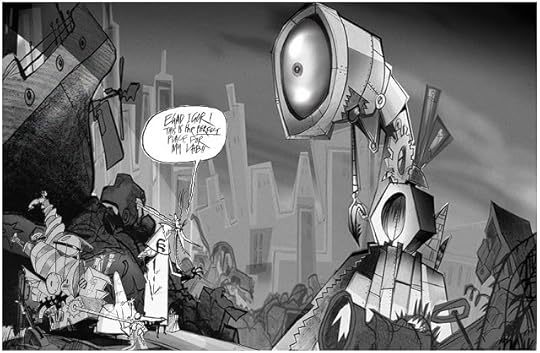 Dr N. Sayne builds his lab at the rubbish dump
Dr N. Sayne builds his lab at the rubbish dump
============//============
PAINTINGS
I did a triptych:

& this is a blue cattledog, and a vampyre.

============//============
PHOTOGRAPHS
I did Photography (among other subjects, like Screenwriting) for my undergrad Comms degree in 1991-3... I've been the Stills Photographer on a few feature films. Also, I just like taking photos...?
Here's one:
 And a poem to go with it.
And a poem to go with it.
Also I often take a lot when I go to conferences...
(I took the 3 at the bottom)

& Here's some from a The Prodigy concert: (great lightshow!)

============//============
INTERACTIVE INSTALLATION ARTWORKS
Now and then I write scripts, and do story & interactive consulting for interactive installation artworks... e.g. `The Very Near Future', by Alex Davies:

See: The Very Near Future - art installation.
============//============
Ph.D.s
Okay, so I only have one so far -
My Ph.D.:

The StoryAlity Ph.D. Dissertation (Velikovsky 02016)
You can download the Ph.D. Dissertation as a PDF (for free), here.
(Or, more quickly - without as many clicks-thru - here.)
See also my PhD blog (StoryAlity) for: vastly more info.
& Here's a super-duper short version of it: (10 mins, as opposed to 450 pages, or whatever)
The StoryAlity PhD in 10 minutes, or it's FREE~!!!
(P.S. It's free, anyway.)
I also do

STORYALITY - High-RoI (Return-on-Investment) Film/Story/Screenplay Consulting
See: Services & Rates
(My Consulting Rates seem expensive, but - they're not as expensive as Hollywood's-! :)
& For some of "the information" (about: creating high-RoI feature films) - see, also this post:
StoryAlity BlogPost #150 - Key Findings – from The StoryAlity PhD on High-RoI Movies (Velikovsky 2016)
============//============
PROMO VIDEOS
In 2017, I shot & edited these short Promo Videos, for the Bathurst Arts Trail:
------------/-------------
& here's another one (playlist of 13 videos), on some:
Central West NSW Authors & Artists - & stuff... (2017)
------------/-------------
& here's some stuff on an art exhibition by Dr Jim Frazier OAM(David Attenborough's cameraguy):
`Out Of This World' - an Exhibition of Crystal Art and Butterflies by Dr Jim Frazier OAM ACS (02019)
============//============
& That's about it, for now...?
I usually post any exciting NEWS, here on my PhD-blog NEWS page......but, that all depends on your definition of "exciting", I guess.Maybe, that stuff's all relative.
Thanks for reading/viewing~!
-----------------------------
You have been reading/viewing a blog-post by:
Dr J T Velikovsky
AI Researcher & Enthusiast... & Evolutionary Culturologist & Filmmaker & Writer & Artist & Actor & Muso & Random Guy
(and, also The StoryAlity Guy) aka Humanimal
-------------------





Transmedia Blog: On Writering
IMDb (Movies, Videogames): Music: Texas Radio & Zen StupidityYoutube channel: https://www.youtube.com/joeteevee (over 100 videos, some are even: good)
Academia page: https://newcastle-au.academia.edu/JTVelikovsky
Researchgate page: https://www.researchgate.net/profile/Jt_Velikovsky
My ouvre...
etc etc.
For more, see On Writering and StoryAlity News
Dr Joe T (aka: J.T.) Velikovsky Ph.D. (aka: JTV)
(Updated: January 02020)

Ph.D. in Communication & Media Arts
 JTV graduates the PhD (02017)
JTV graduates the PhD (02017)
============//=============
So my Short C.V. (2 pages) is here, & my Long C.V. is here. (If, you like that sort of thing...)
& Here's a summary of me, of sorts:
J. T. Velikovsky, PhD (Communication and Media Arts) is a member of the Future Work Research Group (FASTLab Research Center) and Communication and Media Research (CAMR) Group at University of Newcastle, Australia. He is also a million-selling, multi-award-winning transmedia writer (videogames, movies, television, books, songs, comics), filmmaker, songwriter, musician, and actor. He has been a judge for the Australian Writers Guild and Australian Directors Guild, and serves on the editorial board of the International Journal of Art, Culture and Design Technologies.
JTV's Academic Research interests include: Applied Evolutionary Epistemology; biological & cultural evolution; creativity, and consilience.
============//=============
& Below are some of my past projects, sorted into the media-categories of:
FILMS / MOVIES / FILMOVIES (i.e. Feature-length)SHORT FILMS (Shorts)VIDEOGAMESCOMPUTER PROGRAMS/SOFTWARETVNOVELSNON-FICTION BOOKSPLAYSSHORT STORIESARTICLES (in: JOURNALS, BOOKS, ENCYCLOPEDIAS, etc)POEMSJOKESSONGSCARTOONS & COMIXPAINTINGSPHOTOGRAPHSINSTALLATION ARTWORKSPh.D.sPROMO VIDEOS
============//============= FILMS / MOVIES / FILMOVIES (Feature-length) (That I've been involved with, in some capacity)
Drumroll...

RUNAWAY CHAINSAW - The 90-minute Comedy Feature-Film (2016)
A (magic) chainsaw gets away from a bloke,and goes on a tour across the countryside.
Visit: http://runaway-chainsaw.blogspot.com.au/
(I was: Writer-Producer-Director-Cameraman-Actor-Editor-Sound- & Continuity-Guy.)
(I wanted to see if one guy could make a Top 20 RoI movie [a movie that makes over 71 times its production budget] in a week. ...Turns out, you can!)
The Short Film version of it (14 mins, as opposed to 90 mins) also won some awards.
-----------/-------------
Also:
 The Jungle
(2013)
The Jungle
(2013)Big cat conservationist LARRY BLACK and his filmmaker brother BEN travel into the Indonesian jungle to find and document the rare and endangered Javan Leopard. As they travel deeper and deeper into the jungle they realise they are being stalked by a deadly predator.
The Jungle - Trailer
(I had various roles on this film, long story. See the End Credits in the film itself.)
-----------/-------------
 Caught Inside
- Movie Poster
Caught Inside
- Movie PosterWinner, Audience Award, Sydney Film Festival 2010 Winner, Independent Spirit Award, IF (Independent Film) Awards 2010 SXSW (South By Southwest Film Festival) 2011 - official selection.
Caught Inside (2010) - Trailer
The world's first surf-thriller-horror film (!)
When a tight-knit group of surfers venture to a secluded island paradise on the 'surfari' of their lives, they make the mistake of bringing the one thing that can tear them all apart: a beautiful young woman...! As tensions boil over and friendships fall to the side, a `monster' emerges from within - the most revered and feared amongst them. A monster, who soon turns their "dream vacation" - into a nightmare fight for survival...
"CAUGHT INSIDE: Anyone is a weapon if you twist them right..."
(I was a co-writer on the film.)
-----------/---------------
& some of my spec movie screenplays...
============//=============
SHORT FILMS:
 Rocket Man
- movie poster
Rocket Man
- movie poster
Rocket Man (1997) (Rated R) (10 mins) (Docu-Drama/Science Fiction)
The incredibly true story of Darwin Edward Cole - "the serial killer who saved the world."
(I was a co-writer on the film.)
-----------/-------------
Retro Sheilas - in - SPACE ALIENS ARE TOOLING OUR SHEIIAS~!!!
(1995) (Comedy - Rated R) (7 mins)
Three truckin' Aussie super sheilas embark on a mission to save the earth against alien invasion, with unexpected consequences. For Adults Only!(I was writer on the film. Also acted in it.)
-----------/-------------
Hero (4 min excerpt) (Psychological Horror / Drama) (13 mins)
A lonely man finds a woman's lost mobile phone and sets about rescuing her from violent thugs.
(I was a co-writer on the film. Also did: Continuity, on set.)
-----------/-------------
Short film:
RUNAWAY CHAINSAW ™ in Bathurst - Trailer
A (magic) chainsaw gets away from a bloke, and roars off on a `historical sight-seeing tour' of Bathurst, NSW, Australia.
RUNAWAY CHAINSAW ™ in Bathurst (Short Film - 14 mins)
See here for more details.
(I was: Writer-Producer-Director-Cameraman-Actor-Production Designer-Editor-Sound-StuntMan, Chainsaw-Puppeteer & Continuity-Guy on the film.)
-----------/------------- Short Film & Full-Length Stageplay:
 Stageplay poster
Stageplay posterDarwin Down Under (in 1836!) (Historical Comedy)
The story of Charles Darwin's historic visit to Bathurst, NSW, Australia, in 1836.
For more see: the stage play (blog post).This film also won an award.
(I was the Writer, Director, Narrator, Animator, Sound-guy, etc.)
-----------/-------------
Robo-Tato - in... THE ROBOTS are COMING!!! (30 secs)
(I did everything, including strip the Mr Potatohead, but that's not really saying much.)
I also make Art Films, but not always on purpose:
What is it LIKE, to be: a bat? (10 mins)
Attack of the Bin Chickens (ANZCA Conference, 2017)
============//=============
VIDEOGAMES
3-D Augmented-Reality Sky Invaders (A-Rage 2005)
An award-winning Augmented-Reality game: "3-D Sky Invaders" produced by A-Rage Pty Ltd.
(A-Rage - Augmented Reality: Active Game Engine)
 A-Rage game system
A-Rage game system(I was the Producer-Director-Writer-Game Designer)
(We also published a conference paper in 2005, on this augmented-reality games technology.)
-----------/-------------
Looney Tunes: ACME ARSENAL (Warner Bros 2007) (Console game - sold a million copies, on: PS2, Wii, & XBox360)
Gamers can arm themselves for fun in the all-new LOONEY TUNES: ACME ARSENAL videogame. Tag-team with the Tunes as they fight for their lives in a combat-packed, pick-up-and-play videogame. The ever-popular Looney Tunes characters keep their irreverent humour and get a cool, modern look created by Warner Bros. Animation for their romp through time in an action-oriented, arcade style game. Players will find themselves immersed in fast-paced combat with incredible weapons, puzzle-solving challenges and vehicle-based action in rich environments inspired by the beloved, outlandish cartoons.(I was the Senior Game Designer & also, Writer.)
-----------/------------
Liferaft Mobile-phone interactive-soap-opera game8 x 1-minute episodes
Watch the 1-min Eps, and decide , over 8 Episodes of the series, if you will Save - or simply `Savour the schadenfreude' - of Shane & Freida, a honeymooning couple stuck on a sinking liferaft...
(I was the Writer & Designer)
============//============
COMPUTER PROGRAMS / SOFTWARES
The Robo-Raconteur (artificial-writer computer-program) - Demo video
For more, see: The Robo-Raconteur (Velikovsky 2017)
-----------/------------
StoryAlity: The Creative Practice Theory (CPT) Agent-Based Model
For more, see: The `Creative Practice Theory’ Agent-Based Model
The Systematizer (How systems work)
============//============
TV
 (Science fiction TV series)
(Science fiction TV series)
(...I've also done a bunch of other TV stuff, I'll put it in here, soon...)
============//============
NOVELS
I wrote a novel called A Meaningless Sequence of Arbitrary Symbols (AM SO AS), in 2011.
 AM SO AS (2011)
AM SO AS (2011)OSCAR, a disaffected teenager is mentored in the Art of Game Design - by God Himself...But - can he solve the mystery of the Meaningless Sequence of Arbitrary Symbols in time-?
A Satirical Magic-Realist Bangsian Fantasy Coming-of-Age Novel about Videogames, and Everything Else, as Well...(and yes - we're living in a simulated multiverse)by Oscar Velikovsky (no relation)© 252nd November 2088.
Novel & Game Trailer - (40 secs)for the novel `A Meaningless Sequence of Arbitrary Symbols' (aka "The Voice of the Videogame Generation") and - the free videogame "BOOKS KILL PEOPLE".
See the book's website, here.
----------/------------
Also, as of the year 02020, I've got another novel partway written; I'm serializing it in chapters on a blog:

J.B.: ABOVE-TOP-SECRET AGENT PERSON GUYinAdventure #1: “The Case of the Thing with the Thing, and Whatsaname” By: JT Velikovsky© August 12th 02017, and whatever
(And, I have a few other drafts of novels... but, I gotta beat 'em into shape yet.)
============//============
NON-FICTION BOOKS

The Feature Film Screenwriter's Workbook (Velikovsky 1995/2011)
For more info, see here.
And, here.
----------/------------
 The STORYALITY™ Screenwriting Manual
(2013)See: StoryAlity #67 – The STORYALITY™ Screenwriting Manual (2013): out now on Kindle
-------/-----------
The STORYALITY™ Screenwriting Manual
(2013)See: StoryAlity #67 – The STORYALITY™ Screenwriting Manual (2013): out now on Kindle
-------/-----------
I co-edited this book of conference proceedings:

See: StoryAlity #96 – Transmedia Practice: A Collective Approach (2014)
============//============
STAGEPLAYS

The Abercrombie Zombie
A historical comedy play about Ralf Entwhistle and the Ribbon Gang in Bathurst, Australia - in 1830 !
Written by JT Velikovsky
See the website, here.
-------------/--------------
Darwin Down Under

(See above; we already talked about this :)
============//============
SHORT STORIES
Spartacus The Incubus (1994) - Horror-comedy short story, in the anthology Shadows of Life
Roadkill (OPUS Magazine, 1993) - Horror-comedy short story
The Ancient Cities of Tomorrow (365 Tomorrows, 2019) - Science fiction (flash fiction)

...etc...
============//============
ARTICLES (in: JOURNALS, BOOKS, ENCYCLOPEDIAS, etc)
StoryAlity #144 – My article: `The structure of the meme, the unit of culture' (in: The Encyclopedia of Information Science & Technology, Velikovsky 2017)
StoryAlity #151 – My article on Stanley Kubrick, Charles Darwin and Joe Campbell’s monomyth, in The Journal of Genius and Eminence (March 2018)
StoryAlity #136 – 5 articles in Pop Culture in Asia and Oceania (2016)
StoryAlity #132 – The holon/parton structure of the Meme, the unit of culture – and the narreme, or unit of story – book chapter (Velikovsky 2016)
StoryAlity #125 – My article on Nia Vardalos, in Women Screenwriters: An International Guide (2015)
StoryAlity #152 – The Holon/Parton Structure of the Meme, or The Unit of Culture. In the book Advanced Methodologies and Technologies in Artificial Intelligence, Computer Simulation, and Human-Computer Interaction (2019)
& I have a few chapters in Miller's Compendium of Timeless Tools for the Modern Writer (2015)

============//============
POEMS
Now and then I also write poems... See some of them at my Outrageous Bullshit satirical-comedy blog. (e.g. I wrote a sonnet, about the 2019/2020 Aussie bushfires, etc...)
And see my collection of: Horrifying Haikus .
And I once wrote one, using only the top 100 most commonly used English words....It used to be here, but seems to be gone from there, now. I must find it again sometime.
============//============
JOKES
I've been a joke-writer for TV shows, and comedians, etc. Here's a bit of standup. It has a few jokes in it. (What's not to like about: jokes?)
JTV Standup Comedy - Bit #42
============//============
SONGS

I'm in a band called Texas Radio & the Big Beat. In the band I play bass, & sing a bit.We've released 2 albums: the white album & black album.
Here's the 2 `album samplers':
Everything's Okay (Texas Radio & the Big Beat) - the white album sampler
(Texas Radio & the Big Beat) - the black album sampler
(I wrote the songs: Monkey Boy, Juicy Flirt, NASA Be Informed, Mr Velikovsky, & Wonder Why)
For more info on all that, go here.
-----------/------------
I also write, perform & record music `solo' sometimes... Just for shiggles, I wrote & recorded an album called Zen Stupidity:

Zen Stupidity: An Concept Albumen by JTV
(I wrote, played & recorded all that stuff.)
============//============
CARTOONS / COMIX
Here's some of my random comix.
e.g. Naked Philosophy Guy, Dr N. Sayne - Mad Professor, Dog Weiner-Dog, etc



 (Dr N Sayne is: written by me (aka `Tesla'), & drawn by Deane Taylor)
(Dr N Sayne is: written by me (aka `Tesla'), & drawn by Deane Taylor)
 Dr N. Sayne builds his lab at the rubbish dump
Dr N. Sayne builds his lab at the rubbish dump============//============
PAINTINGS
I did a triptych:

& this is a blue cattledog, and a vampyre.

============//============
PHOTOGRAPHS
I did Photography (among other subjects, like Screenwriting) for my undergrad Comms degree in 1991-3... I've been the Stills Photographer on a few feature films. Also, I just like taking photos...?
Here's one:
 And a poem to go with it.
And a poem to go with it.Also I often take a lot when I go to conferences...
(I took the 3 at the bottom)

& Here's some from a The Prodigy concert: (great lightshow!)

============//============
INTERACTIVE INSTALLATION ARTWORKS
Now and then I write scripts, and do story & interactive consulting for interactive installation artworks... e.g. `The Very Near Future', by Alex Davies:

See: The Very Near Future - art installation.
============//============
Ph.D.s
Okay, so I only have one so far -
My Ph.D.:

The StoryAlity Ph.D. Dissertation (Velikovsky 02016)
You can download the Ph.D. Dissertation as a PDF (for free), here.
(Or, more quickly - without as many clicks-thru - here.)
It's a comparative study of the Top and Bottom 20 Return-on-Investment (RoI) movies. And then - compares those 40 films, to some of the popular screenwriting manuals, to see how correct they are...!(Short story: The (popular) Screenwriting Manuals are only about 50% right...)
See also my PhD blog (StoryAlity) for: vastly more info.
& Here's a super-duper short version of it: (10 mins, as opposed to 450 pages, or whatever)
The StoryAlity PhD in 10 minutes, or it's FREE~!!!
(P.S. It's free, anyway.)
I also do

STORYALITY - High-RoI (Return-on-Investment) Film/Story/Screenplay Consulting
See: Services & Rates
(My Consulting Rates seem expensive, but - they're not as expensive as Hollywood's-! :)
& For some of "the information" (about: creating high-RoI feature films) - see, also this post:
StoryAlity BlogPost #150 - Key Findings – from The StoryAlity PhD on High-RoI Movies (Velikovsky 2016)
============//============
PROMO VIDEOS
In 2017, I shot & edited these short Promo Videos, for the Bathurst Arts Trail:
------------/-------------
& here's another one (playlist of 13 videos), on some:
Central West NSW Authors & Artists - & stuff... (2017)
------------/-------------
& here's some stuff on an art exhibition by Dr Jim Frazier OAM(David Attenborough's cameraguy):
`Out Of This World' - an Exhibition of Crystal Art and Butterflies by Dr Jim Frazier OAM ACS (02019)
============//============
& That's about it, for now...?
I usually post any exciting NEWS, here on my PhD-blog NEWS page......but, that all depends on your definition of "exciting", I guess.Maybe, that stuff's all relative.
Thanks for reading/viewing~!
-----------------------------
You have been reading/viewing a blog-post by:
Dr J T Velikovsky
AI Researcher & Enthusiast... & Evolutionary Culturologist & Filmmaker & Writer & Artist & Actor & Muso & Random Guy
(and, also The StoryAlity Guy) aka Humanimal
-------------------





Transmedia Blog: On Writering
IMDb (Movies, Videogames): Music: Texas Radio & Zen StupidityYoutube channel: https://www.youtube.com/joeteevee (over 100 videos, some are even: good)
Academia page: https://newcastle-au.academia.edu/JTVelikovsky
Researchgate page: https://www.researchgate.net/profile/Jt_Velikovsky
My ouvre...
etc etc.
For more, see On Writering and StoryAlity News
Published on January 08, 2020 06:30
December 15, 2019
On: How To Disagree (Graham 2008)
On:
How To Disagree
(in a debate, & especially: online) (that famous essayicle, by: Graham 2008)
-------Blogpost by JTV--------
There's this great essayicle by Paul Graham, called How To Disagree. Here it is, here.
And - there's a great diagram that Rocket000 drew - to make it easier to see, how it works:
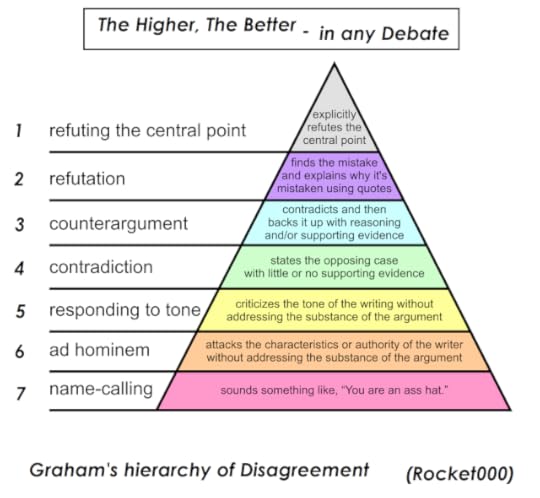
So; yeah.
Do: That.
(I must admit, sometimes, I like to fire all those cannons at once, i.e. All 7 levels! LOL)
-----------------------------
You have been reading a blog-post by:
Dr J T Velikovsky
AI Researcher & Enthusiast& Evolutionary Culturologist
(and, also The StoryAlity Guy) aka Humanimal Transmedia Blog: On Writering
IMDb (Movies, Videogames): Music: Texas Radio & Zen Stupidity& Films about Bathurst...
etc etc. See On Writering and StoryAlity News
-------Blogpost by JTV--------
There's this great essayicle by Paul Graham, called How To Disagree. Here it is, here.
And - there's a great diagram that Rocket000 drew - to make it easier to see, how it works:

So; yeah.
Do: That.
(I must admit, sometimes, I like to fire all those cannons at once, i.e. All 7 levels! LOL)
-----------------------------
You have been reading a blog-post by:
Dr J T Velikovsky
AI Researcher & Enthusiast& Evolutionary Culturologist
(and, also The StoryAlity Guy) aka Humanimal Transmedia Blog: On Writering
IMDb (Movies, Videogames): Music: Texas Radio & Zen Stupidity& Films about Bathurst...
etc etc. See On Writering and StoryAlity News
Published on December 15, 2019 10:08
December 10, 2019
The Search for Meaning doesn't usually reveal it
"The Search for Meaning doesn't usually reveal it"
Just a funny quote from Seth Lloyd.
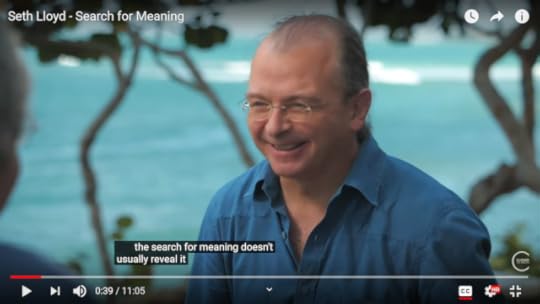
From this Youtube video:
-----------------------------
You have been reading a blog-post by:
Dr J T Velikovsky
AI Researcher & Enthusiast& Evolutionary Culturologist
(and, also The StoryAlity Guy) aka Humanimal Transmedia Blog: On Writering
IMDb (Movies, Videogames): Music: Texas Radio & Zen Stupidity& Films about Bathurst...
etc etc. See On Writering and StoryAlity News
Just a funny quote from Seth Lloyd.

From this Youtube video:
-----------------------------
You have been reading a blog-post by:
Dr J T Velikovsky
AI Researcher & Enthusiast& Evolutionary Culturologist
(and, also The StoryAlity Guy) aka Humanimal Transmedia Blog: On Writering
IMDb (Movies, Videogames): Music: Texas Radio & Zen Stupidity& Films about Bathurst...
etc etc. See On Writering and StoryAlity News
Published on December 10, 2019 05:00
November 21, 2019
Political Compass - online quiz
Political Compass - online quiz
So I did an online quiz: https://www.politicalcompass.org/
These were my results, below - (but - some of the questions weren't phrased correctly, in my view?) I don't think this captures my worldview, all that well... But still. It's a blunt instrument, but there you go.
So - according to this - I'm in between Gandhi & Stalin on the right/left axis (of this particular: quiz), and in between Gandhi & Friedman on the Authoritarian/Liberalism axis.
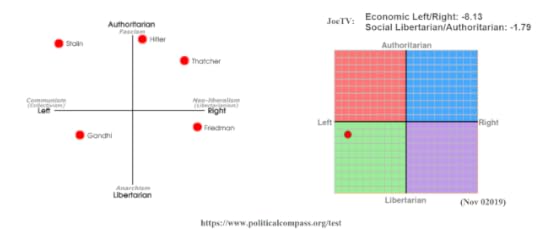
Why would I end up, there?
Probably because of: a complex mix of genes & environment, and life history / lived experience.
Over my life, I've mainly worked in the Arts/Communication (film, tv, games, novels, theater, music, etc). I guess, most of those folks tend to be left-wing/humanist types.
I really like: Popper's The Open Society and its Enemies.
In fact; I like (i.e. agree with) about 95% of everything Popper ever wrote.
Here are a lot of other books I love: (I read them, for my PhD).
Here's more of my favourite thinkers.
-----------------------------
You have been reading a blog-post by:
Dr J T Velikovsky
AI Researcher & Enthusiast& Evolutionary Culturologist
(and, also The StoryAlity Guy) aka Humanimal Transmedia Blog: On Writering
IMDb (Movies, Videogames): Music: Texas Radio & Zen Stupidity& Films about Bathurst...
etc etc. See On Writering and StoryAlity News
So I did an online quiz: https://www.politicalcompass.org/
These were my results, below - (but - some of the questions weren't phrased correctly, in my view?) I don't think this captures my worldview, all that well... But still. It's a blunt instrument, but there you go.
So - according to this - I'm in between Gandhi & Stalin on the right/left axis (of this particular: quiz), and in between Gandhi & Friedman on the Authoritarian/Liberalism axis.

Why would I end up, there?
Probably because of: a complex mix of genes & environment, and life history / lived experience.
Over my life, I've mainly worked in the Arts/Communication (film, tv, games, novels, theater, music, etc). I guess, most of those folks tend to be left-wing/humanist types.
I really like: Popper's The Open Society and its Enemies.
In fact; I like (i.e. agree with) about 95% of everything Popper ever wrote.
Here are a lot of other books I love: (I read them, for my PhD).
Here's more of my favourite thinkers.
-----------------------------
You have been reading a blog-post by:
Dr J T Velikovsky
AI Researcher & Enthusiast& Evolutionary Culturologist
(and, also The StoryAlity Guy) aka Humanimal Transmedia Blog: On Writering
IMDb (Movies, Videogames): Music: Texas Radio & Zen Stupidity& Films about Bathurst...
etc etc. See On Writering and StoryAlity News
Published on November 21, 2019 06:48
November 2, 2019
Evolution critter sim game by Keiwan
So, this critter-design
Evolution
sim game is fun:
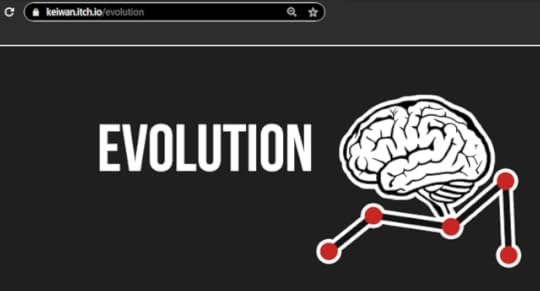
Evolution by Keiwan (accessed 02019)
Like the site says:
Here's a YouTube video by IGP about it:
`BIGGEST BRAIN EVER & WALKING HUMAN - Neural Network MAXED - Evolution Simulator ( Evolution Gameplay)' (02018)
And here's some random critters I made while playing around with it:
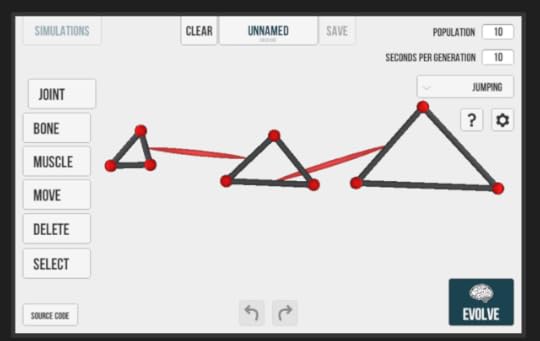
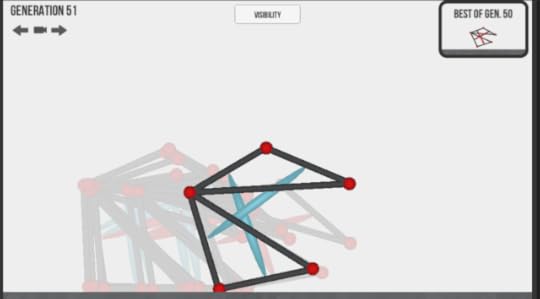
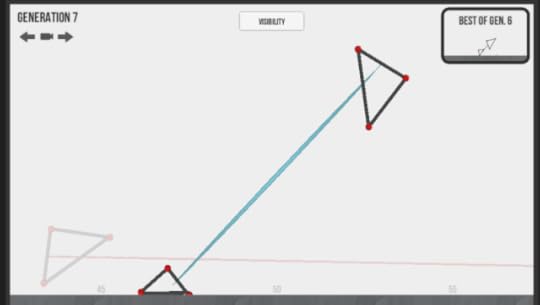
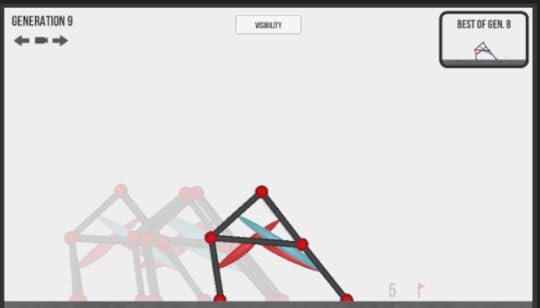
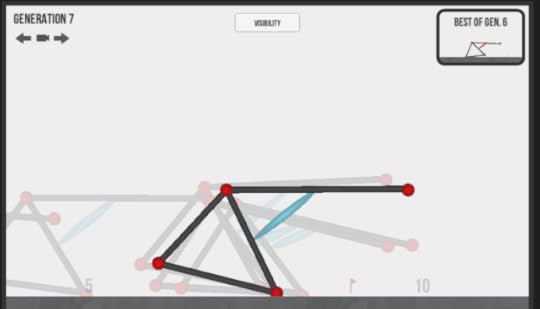
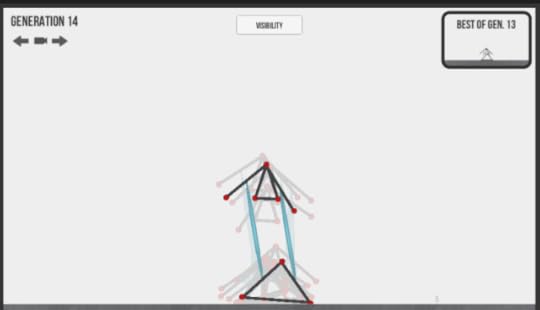
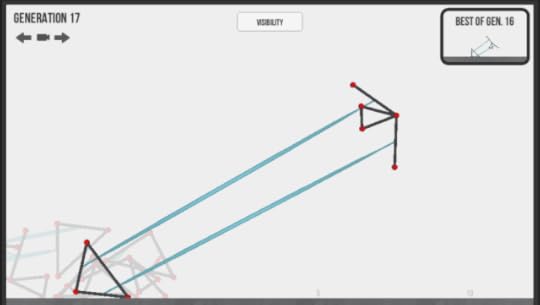
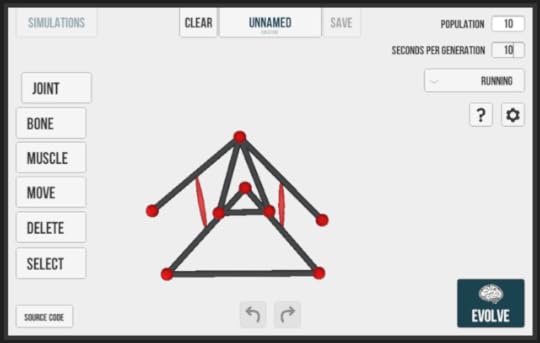
Try it, it's fun!
It demonstrates the obvious physical and spatial issues in evolutionary Design Space.
Some geometrical shapes work better than others when you have gravity & obstacles to deal with.
Which gets back to: Agency and Structure. Which pretty much solves the problem of Free Will, until we can hack the Sim we're in :)
If of interest see also:
The HOLON/parton structure of the meme, the unit of bioculture. And see the 3 Laws of HOLON/partons. (On that same post / in those 5 book-chapters.)
Thanks for reading!
-----------------------------
You have been reading a blog-post by:
Dr J T Velikovsky
AI Researcher & Enthusiast& Evolutionary Culturologist
(and, also The StoryAlity Guy) aka Humanimal Transmedia Blog: On Writering
IMDb (Movies, Videogames): Music: Texas Radio & Zen Stupidity& Films about Bathurst...
etc etc. See On Writering and StoryAlity News
-------------
PS - Another Evolution Sim:
Evolution Simulator (Part 1/4) (by carykh)
For more of these kinda things, maybe Ask Uncle Google: evolution simulator
Maybe see also:
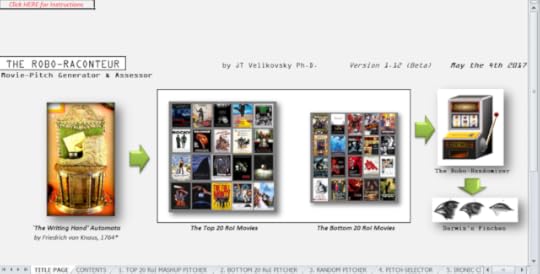
The Robo-Raconteur Artificial-Writer computer program
A video about it:
The Robo-Raconteur
& to dig way deeper into these kinda topics, check out Dan Dennett's great book:
Darwin's Dangerous Idea (1995).

Evolution by Keiwan (accessed 02019)
Like the site says:
`Use joints, bones and muscles to build creatures that are only limited by your imagination. Watch how the combination of a neural network and a genetic algorithm can enable your creatures to "learn" and improve at their given tasks all on their own.
The tasks include running, jumping and climbing.
Can you build the ultimate creature that is good at all of the tasks?'Evolution by Keiwan (accessed 02019)
Here's a YouTube video by IGP about it:
`BIGGEST BRAIN EVER & WALKING HUMAN - Neural Network MAXED - Evolution Simulator ( Evolution Gameplay)' (02018)
And here's some random critters I made while playing around with it:








Try it, it's fun!
It demonstrates the obvious physical and spatial issues in evolutionary Design Space.
Some geometrical shapes work better than others when you have gravity & obstacles to deal with.
Which gets back to: Agency and Structure. Which pretty much solves the problem of Free Will, until we can hack the Sim we're in :)
If of interest see also:
The HOLON/parton structure of the meme, the unit of bioculture. And see the 3 Laws of HOLON/partons. (On that same post / in those 5 book-chapters.)
Thanks for reading!
-----------------------------
You have been reading a blog-post by:
Dr J T Velikovsky
AI Researcher & Enthusiast& Evolutionary Culturologist
(and, also The StoryAlity Guy) aka Humanimal Transmedia Blog: On Writering
IMDb (Movies, Videogames): Music: Texas Radio & Zen Stupidity& Films about Bathurst...
etc etc. See On Writering and StoryAlity News
-------------
PS - Another Evolution Sim:
Evolution Simulator (Part 1/4) (by carykh)
For more of these kinda things, maybe Ask Uncle Google: evolution simulator
Maybe see also:

The Robo-Raconteur Artificial-Writer computer program
A video about it:
The Robo-Raconteur
& to dig way deeper into these kinda topics, check out Dan Dennett's great book:
Darwin's Dangerous Idea (1995).
Published on November 02, 2019 18:37
October 8, 2019
Darwin (1871) on ants!
Darwin (1871) - on ants
Hey, check out this passage on ants (below), from:
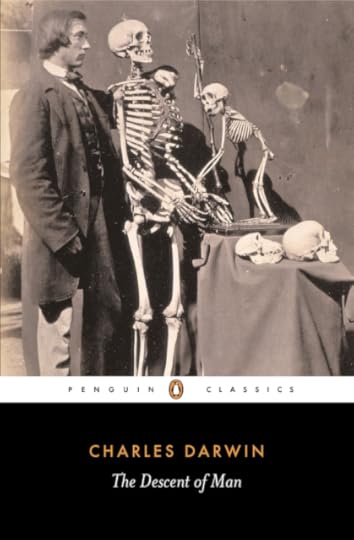 (Darwin 1871)
(Darwin 1871)
The legendary Charlie Darwin (1871, pp .185-89) writes:
Anyway... did you see the bold bit?
Ants are a lot like humans, in many ways. (i.e., They can be jerks too. See the `slaves' and `farming' bits.)
Anyway eusocial animals are crazy. But fascinating.
Anyway - I found it fascinating.
-----------------------------
You have been reading a blog-post by:
Dr J T Velikovsky
AI Researcher & Enthusiast& Evolutionary Culturologist
(and, also The StoryAlity Guy) aka Humanimal Transmedia Blog: On Writering
IMDb (Movies, Videogames): Music: Texas Radio & Zen Stupidity& Films about Bathurst...
etc etc. See On Writering and StoryAlity News .
---------//----------
Hey, check out this passage on ants (below), from:
 (Darwin 1871)
(Darwin 1871)The legendary Charlie Darwin (1871, pp .185-89) writes:
CHAPTER VI.
ON THE AFFINITIES AND GENEALOGY OF MAN.
Position of man in the animal series — The natural system genealogical — Adaptive characters of slight value — Various small points of resemblance between man and the Quadrumana — Rank of man in the natural system — Birthplace and antiquity of man — Absence of fossil connecting-links — Lower stages in the genealogy of man, as inferred, firstly from his affinities and secondly from his structure — Early androgynous condition of the Vertebrata — Conclusion.
EVEN if it be granted that the difference between man and his nearest allies is as great in corporeal structure as some naturalists maintain, and although we must grant that the difference between them is immense in mental power, yet the facts given in the previous chapters declare, as it appears to me, in the plainest manner, that man is descended from some lower form, notwithstanding that connecting-links have not hitherto been discovered.
Man is liable to numerous, slight, and diversified variations, which are induced by the same general causes, are governed and transmitted in accordance with the same general laws, as in the lower animals. Man tends to multiply at so rapid a rate that his off-spring are necessarily exposed to a struggle for existence, and consequently to natural selection. He has given rise to many races, some of which are so different that they have often been ranked by naturalists as distinct species. His body is constructed on the same homological plan as that of other mammals, independently of the uses to which the several parts may be put. He
P. 186 (starts below)
passes through the same phases of embryological development. He retains many rudimentary and useless structures, which no doubt were once serviceable. Characters occasionally make their re-appearance in him, which we have every reason to believe were possessed by his early progenitors. If the origin of man had been wholly different from that of all other animals, these various appearances would be mere empty deceptions; but such an admission is incredible. These appearances, on the other hand, are intelligible, at least to a large extent, if man is the co-descendant with other mammals of some unknown and lower form.
Some naturalists, from being deeply impressed with the mental and spiritual powers of man, have divided the whole organic world into three kingdoms, the Human, the Animal, and the Vegetable, thus giving to man a separate kingdom.1 Spiritual powers cannot be compared or classed by the naturalist; but he may endeavour to shew, as I have done, that the mental faculties of man and the lower animals do not differ in kind, although immensely in degree. A difference in degree, however great, does not justify us in placing man in a distinct kingdom, as will perhaps be best illustrated by comparing the mental powers of two insects, namely, a coccus or scale-insect and an ant, which undoubtedly belong to the same class. The difference is here greater, though of a somewhat different kind, than that between man and the highest mammal.
The female coccus, whilst young, attaches itself by its proboscis to a plant; sucks the sap but never moves again; is fertilised and lays eggs; and this is its whole history. On the other hand, to describe the habits and mental
1 Isidore Geoffroy St.-Hilaire gives a detailed account of the position assigned to man by various naturalists in their classifications: 'Hist. Nat. Gén.' tom. ii. 1859, p. 170-189.
p. 187
powers of a female ant, would require, as Pierre Huber has shewn, a large volume; I may, however, briefly specify a few points.
Ants communicate information to each other, and several unite for the same work, or games of play.
They recognise their fellow-ants after months of absence.
They build great edifices, keep them clean, close the doors in the evening, and post sentries.
They make roads, and even tunnels under rivers.
They collect food for the community, and when an object, too large for entrance, is brought to the nest, they enlarge the door, and afterwards build it up again.2
They go out to battle in regular bands, and freely sacrifice their lives for the common weal.
They emigrate in accordance with a preconcerted plan.
They capture slaves.
They keep Aphides as milch-cows.
They move the eggs of their aphides, as well as their own eggs and cocoons, into warm parts of the nest, in order that they may be quickly hatched; and endless similar facts could be given.
On the whole, the difference in mental power between an ant and a coccus is immense; yet no one has ever dreamed of placing them in distinct classes, much less in distinct kingdoms. No doubt this interval is bridged over by the intermediate mental powers of many other insects; and this is not the case with man and the higher apes. But we have every reason to believe that breaks in the series are simply the result of many forms having become extinct.
Professor Owen, relying chiefly on the structure of the brain, has divided the mammalian series into four sub-classes. One of these he devotes to man; in another he places both the marsupials and the monotremata; so that he makes man as distinct from all other mam-
2 See the very interesting article, "L'Instinct chez les Insectes," by M. George Pouchet, 'Revue des Deux Mondes,' Feb. 1870, p. 682.
p. 188
mals as are these two latter groups conjoined. This view has not been accepted, as far as I am aware, by any naturalist capable of forming an independent judgment, and therefore need not here be further considered.
We can understand why a classification founded on any single character or organ—even an organ so wonderfully complex and important as the brain—or on the high development of the mental faculties, is almost sure to prove unsatisfactory. This principle has indeed been tried with hymenopterous insects; but when thus classed by their habits or instincts, the arrangement proved thoroughly artificial.3
Classifications may, of course, be based on any character whatever, as on size, colour, or the element inhabited; but naturalists have long felt a profound conviction that there is a natural system. This system, it is now generally admitted, must be, as far as possible, genealogical in arrangement,—that is, the co-descendants of the same form must be kept together in one group, separate from the co-descendants of any other form; but if the parent-forms are related, so will be their descendants, and the two groups together will form a larger group. The amount of difference between the several groups—that is the amount of modification which each has undergone—will be expressed by such terms as genera, families, orders, and classes. As we have no record of the lines of descent, these lines can be discovered only by observing the degrees of resemblance between the beings which are to be classed. For this object numerous points of resemblance are of much more importance than the amount of similarity or dissimilarity in a few points. If two languages were found to resemble each other in a multitude of
3 Westwood, 'Modern Class. of Insects,' vol. ii. 1840, p. 87.
p. 189
words and points of construction, they would be universally recognised as having sprung from a common source, notwithstanding that they differed greatly in some few words or points of construction. But with organic beings the points of resemblance must not consist of adaptations to similar habits of life: two animals may, for instance, have had their whole frames modified for living in the water, and yet they will not be brought any nearer to each other in the natural system.
Hence we can see how it is that resemblances in unimportant structures, in useless and rudimentary organs, and in parts not as yet fully developed or functionally active, are by far the most serviceable for classification; for they can hardly be due to adaptations within a late period; and thus they reveal the old lines of descent or of true affinity.'
(Darwin 1871, pp. 185-9)
Anyway... did you see the bold bit?
Ants are a lot like humans, in many ways. (i.e., They can be jerks too. See the `slaves' and `farming' bits.)
Anyway eusocial animals are crazy. But fascinating.
Anyway - I found it fascinating.
-----------------------------
You have been reading a blog-post by:
Dr J T Velikovsky
AI Researcher & Enthusiast& Evolutionary Culturologist
(and, also The StoryAlity Guy) aka Humanimal Transmedia Blog: On Writering
IMDb (Movies, Videogames): Music: Texas Radio & Zen Stupidity& Films about Bathurst...
etc etc. See On Writering and StoryAlity News .
---------//----------
Published on October 08, 2019 11:28
October 3, 2019
Thoughts and Notes on `Will AI Replace Us?' (Fan 2019)
Thoughts and Notes on `Will AI Replace Us?' (Fan 2019)by JT Velikovsky
Will A.I. replace us humanimals? ...I certainly hope so. Look how cool these robots are.
10 Incredible Robots That Actually Exist (Youtube 2018)
Meantime, Shelly Fan (2019) has written a great little book called...
Will AI Replace Us? A primer for the 21st century.
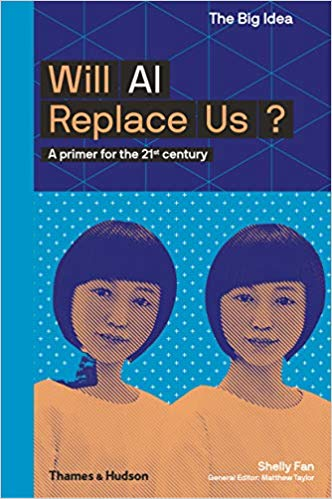 Fan, S. (2019). Will AI replace us? A primer for the 21st century. London, Thames & Hudson Ltd.
Fan, S. (2019). Will AI replace us? A primer for the 21st century. London, Thames & Hudson Ltd.
Here is the Abstract of the book:
--------------
Below are some Notes I took while reading it, and also some Comments and Discussion Points for my students.
But first I'd recommend reading all 3 books by Yuval Noah Harari, also Life 3.0 by Max Tegmark, and Superintelligence by Nick Bostrom.
A quote from (Fan 2019) that I liked:
Take a look at this (2007) paper, which has 70 definitions, gathered from here, there, & everywhere:
Maybe it's just: problem-solving ability.
All of this reminds me of, the (similar) problem in defining "culture".
See my (2016) PhD Appendix (book chapter), where I wrote:
On page 10, Fan (2019) rightly notes that AI was misused when the jerks at Cambridge Analytica targeted some swinging voters (who also aren't very good critical thinkers, I might add) and caused: Trump, and Brexit... (What a nightmare. This is the dark side of AI. When you get jerks using it, for jerky purposes. Anyway - see this documentary below, for the whole debacle... Below is: the Trailer.)
The Great Hack (Netflix 2019)
Moral: Don't let evil jerks use AI, or they can ruin the world for everyone. Like they have, with Trump and Brexit. Both of which were - and still are - terrible ideas... Read Harari's great book 21 Lessons (2018) to see why... I don't have time to get into it all here. Also we need robo-politicians (cyber-democracy). Mainly as humanimals aren't capable enough to run the world any more, it's all gotten too complex for human brains...
But anyway - back to Fan (2019).
On page 11, it notes, since 2018, Baidu (2nd largest search engine in the world, after Google) has voice-mimicing tech (`voice-cloning AI') that can simulate a human voice, by only listening to a minute of spoken text...! And, of course, Google has Duplex.
Google Duplex: A.I. Assistant Calls Local Businesses To Make Appointments (YouTube 2018)
For more, see this VICE article on Deep Voice (Cole 2018). (...In fact, it only needs 3.7 seconds of audio! But with 100 samples, it's: pretty good.) If you want to go deeper, there's an arXiv article (2018) on Baidu's Deep Voice software, here.
Fan (2019, p. 11) also notes the problem of: deepfake porn. (Then again - maybe if robots take porn-performers' jobs, it's a good thing? Ethically, I mean.)
Also - this is basic stuff, ("AI-101") but worth pointing out - the definition of "brute force" in AI.
Page 12 also talks about IBM's Watson winning Jeopardy back in 2011...
IBM's Watson wins Jeopardy
And, AlphaGo beating the world Go champ (Lee Sedol) in 2016. (See the great doco, below.)
AlphaGo documentary (Trailer)
Pages 14 and 15 of Fan (2019) mention: the One Hundred Year Study on Artificial Intelligence (AI100) Stanford University (2015). There is another report coming in the year 2020 (next year).
As for the history of AI, (Fan 2019, p. 18) rightly notes, the study of AI is customarily dated to the Dartmouth workshop in 1956, organized by Maths professor, John McCarthy.
Page 19 mentions how Aristotle invented syllogistic logic , which is basically an algorithm.
Namely, something like: "Major premise: All M are P. Minor premise: All S are M. Conclusion: All S are P." (Set Theory.)
P 19 also has a definition of algorithm: (I love collecting definitions of "algorithm" :)
An excerpt:
Page 23 talks about Alan Turing, and also Bernoulli Numbers...
Page 24 talks about Turing's essay Computing Machinery and Intelligence (1950), which asks "Can machines think?". And, from whence comes, the Turing Test...
P 27 mentions toy problems.
P 29 mentions OpenAI, founded in 2015 by Elon Musk and Sam Altman.

P 34 has a good definition of GOFAI:
(If you try a search, try searching on "tree" or "cat" for a start.)
Another good quote:
Intro to Deep Learning 2018 - Lesson 1 (Youtube 2018)
Page 42 of Fan (2019) has a terrific chart:
`A mostly complete chart of neural networks by Fjodor Van Veen' (Fan 2019, p. 42)
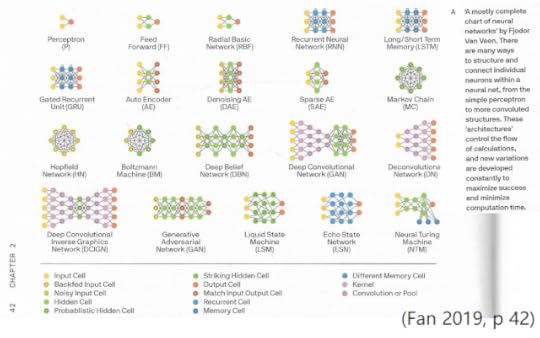
Also this is cool: a GAAE (on Fan 2019, p. 58).
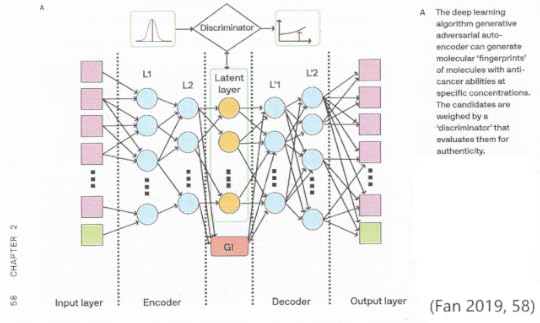
And another great quote from Fan is on pp 44-5:
And, here is something interesting:
In regard to self-driving vehicles, Fan (2019) mentions "the support vector machine, a popular algorithm inspired by human psychology. The exotically named algorithm relies on a simple principle: that humans learn by analogies." (p. 50)
PP 52-3 mentions reinforcement learning... "a type of trial and error often used to train animals. In short, an action either receives a reward or a penalty, and the animal gradually changes its behavior to the desired outcome. For animals, the reward is often food. In AI, the reward is a number that the algorithm is trying to maximize. During learning, the reward can either be short term, given immediately following an action, or long term, only given after an entire action sequence." (pp. 52-3)
Another cool quote:
Hey - so here's Google's DeepMind using Deep-Q Learning, optimizing a player strategy for Atari Breakout:
Google DeepMind's Deep Q-learning playing Atari Breakout (Youtube 2015)
Also, I liked this definition of working memory:
A good definition of Big Data:
Think of all the books he read, and information he absorbed.
No wonder he cracked: evolution.
Hey - here's a mind-blowing read: (seriously)
Exploration and Exploitation of Victorian Science in Darwin’s Reading Notebooks (2017) byJaimie Murdock a,b, Colin Allen a,c,d, Simon DeDeo a,b,e,f,∗
Page 58 of Fan (2019) talks about evolutionary algorithms...
I found this interesting:
Lithium-Ion Batteries: A Machine-Generated Summary of Current Research (Beta Writer 2019)
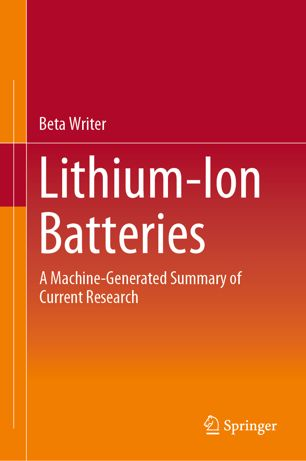
Page 59 of Fan (2019) also talks about: Suki.

Reeti (Youtube 2011)
Pp 66-7 talks about Tay, Microsoft's (2016) Twitter chatbot which went off the rails and became sexist and racist (and generally: offensive) within a day, due to internet trolls gaming its system. The Moral: GIGO (Garbage In, Garbage Out).
 Microsoft's Tay (acronym for: Thinking About You) (2016).
Microsoft's Tay (acronym for: Thinking About You) (2016).
Page 66 talks about gender and racial bias in AI, due to programming flaws and problems of human nature.
P68 talks about the US Navy's SAFFiR. As a former firefighter: I like it! Send in the firefighting bots.
SAFFiR - Shipboard Autonomous Firefighting Robot (Youtube 2015)
Another cool quote:
P 76 talks about some problems in AI, such as Google Photos' (2015) GorillaGate, and racial bias in COMPAS.
p 80 talks about ethical AI, and The IEEE Global Initiative for Ethical Considerations in Artificial Intelligence and Autonomous Systems [Standards] (2017).
P 82 talks about China's social credit system... The gamification of society! (And why not.)
Another cool quote:
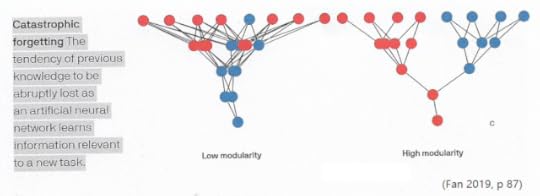
Basically, you can turn the modules on or off, so they don't get overwritten.
And, overall, according to Fan (2019) here's the bottom line:
See also my review of Novacene (Lovelock 2019).
P 94 of Fan (2019) talks about the (2017) SoftBank "robo-coffee-shops" in Japan...
Robots Pepper and duAro to work in NESCAFE Coffee Shop in Japan (Youtube 2017)
Side Note: Q: How Many "Peppers" have stolen human jobs, anyway? A: See, this article (August 2019). It says: "About 15,000 Peppers are deployed in Japanese and European banks, fast service restaurants and healthcare settings."
An ad for Pepper the robot (Youtube 2017)
Hey - randomly - this one (Sophia) is a bit creepy: (uncanny valley problems)
We Talked To Sophia — The AI Robot That Once Said It Would 'Destroy Humans' (Youtube 2017)
And here are some supercool robots - (e.g.: Spot-mini, BigDog, Handle, WildCat, Sand Flea, Atlas the Dynamic Humanoid, etc):
Boston Dynamics robots (Youtube 2017)
As for robots taking jobs (and replacing humanimals), here's also a good quote:
Bring on: Universal Basic Income.
And let the robots do all the work.
(Who needs: work? Work is for losers. And, robots.)
See: In Praise of Idleness (Bertrand Russell 1934).
Page 100 of Fan (2019) talks about Universal Basic Income...
Rutger Bregman on Universal Basic Income (Youtube 2017)
Here's another supercool quote:
P 106 talks about neuromorphic chips...
Another good definition:
Yet another good definition:
See Harari on "The Rise of the Useless Class"...!
Harari on his book Homo Deus (Youtube 2016)
Here's a quote from Fan (2019) that I love:
P 124 talks about the legal document generator, ROSS.
Pp. 124-5 talks about Word Lens:
Word Lens (Youtube 2010). Note: "Word Lens has now been integrated to the Google Translate app, and is not available anymore as a standalone app."
P 125 talks about the automated news writing system, RADAR.
Here's another great quote:
It is the job of science fiction to: imagine the future, and show possible scenarios. Good and bad.
I am not talking about just some sci fi (the dystopian stuff), but consider all science fiction.
It did actually predict: "some of the negative personal and social outcomes of its use, such as invasion of our privacy, social media addiction and the prevalence of fake news"... !See, stuff like Neuromancer, Snow Crash, Brave New World, and so many more...
(See: lots of sci-fi short stories about all that stuff...)...Just sayin :)
Check out everything on Youtube, by Yuval Noah Harari. And, read his (GREAT!) 3 books...
Watch this, from: 35 mins 15 secs, onwards (Yuval Noah Harari on: science fiction)
See also: The Robo-Raconteur (2018)
Anyway - this is a pretty great book, so, buy and read it:
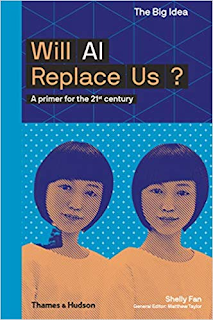
(Cool list! I've read about half of 'em...)

Anyway - so I very highly recommend (Fan 2019).
Buy and read it!
Hey you know what's big news?
In 2018, AI entered: the DPFi sociocultural systems model of creativity...
(After 30 years of not being there!)
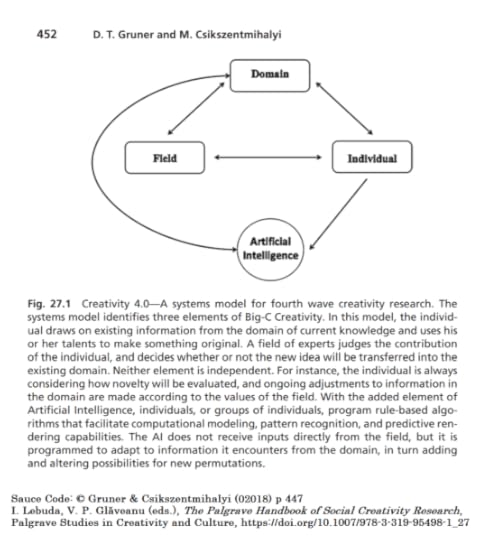
See: Creativity 4.0 Diagram!
Thanks for reading. And, watching.
-----------------------------
You have been reading a blog-post by:
Dr J T Velikovsky
AI Researcher & Enthusiast& Evolutionary Culturologist
(and, also The StoryAlity Guy) aka Humanimal Transmedia Blog: On Writering
IMDb (Movies, Videogames): Music: Texas Radio & Zen Stupidity& Films about Bathurst...
etc etc. See On Writering and StoryAlity News .
---------//----------
Will A.I. replace us humanimals? ...I certainly hope so. Look how cool these robots are.
10 Incredible Robots That Actually Exist (Youtube 2018)
Meantime, Shelly Fan (2019) has written a great little book called...
Will AI Replace Us? A primer for the 21st century.
 Fan, S. (2019). Will AI replace us? A primer for the 21st century. London, Thames & Hudson Ltd.
Fan, S. (2019). Will AI replace us? A primer for the 21st century. London, Thames & Hudson Ltd.Here is the Abstract of the book:
`The past sixty years have witnessed astonishing bursts of growth in the field of Artificial Intelligence - the science and computational technologies that teach machines to sense, learn, reason and take action. AI is already changing our lives, in ways that benefit health, productivity and entertainment. Are we on the threshold of an AI-dominated world, in which humans will no longer be necessary?' (Fan 2019)My review?I like it. It's a good review of the current issues, topics and trends facing us, regarding AI.In a nutshell, buy it and read it.
--------------
Below are some Notes I took while reading it, and also some Comments and Discussion Points for my students.
But first I'd recommend reading all 3 books by Yuval Noah Harari, also Life 3.0 by Max Tegmark, and Superintelligence by Nick Bostrom.
A quote from (Fan 2019) that I liked:
`AI is the most human of technologies. It began with the idea of creating machines that imitated humans. It developed by copying human thought processes and by learning from and extracting from human brains.' (Fan 2019, p. 8)Which is all fair enough...?This one below is also funny (because it's true):
`An inside joke is that once a machine can do something previously only achieved by humans, then the task is no longer considered a sign of intelligence.' (p. 9)...What is intelligence, after all? The definition of intelligence is currently an unsolved problem as there's not a consensus. Depends who you ask (and, in which domain in culture), and what they're examining.
Take a look at this (2007) paper, which has 70 definitions, gathered from here, there, & everywhere:
Legg & Hutter (2007). `A Collection of Definitions of Intelligence'. Frontiers in Artificial Intelligence and Applications, Vol. 157 (2007) pp. 17-24Abstract:
`This paper is a survey of a large number of informal definitions of "intelligence'' that the authors have collected over the years. Naturally, compiling a complete list would be impossible as many definitions of intelligence are buried deep inside articles and books. Nevertheless, the 70-odd definitions presented here are, to the authors' knowledge, the largest and most well referenced collection there is.'Short story: There is `g factor' or general intelligence (as tested in: IQ tests), but also, Gardner's multiple intelligences...
Maybe it's just: problem-solving ability.
All of this reminds me of, the (similar) problem in defining "culture".
See my (2016) PhD Appendix (book chapter), where I wrote:
`INTRODUCTION
This chapter proposes a formal structure for the unit of culture, also known as the meme (Dawkins, 1976), namely: the holon/parton (Velikovsky, 2013b), synthesizing concepts from (Koestler 1967) and Feynman (2005).
Previously, an unsolved problem across media, the arts, entertainment and science has been defining ‘the unit of culture’, resulting in over three hundred varying definitions of culture (Baldwin et al 2006), and no consensus (van Peer et al 2007).'
(Velikovsky 2016, p. 208)Anyway, so - defining "intelligence" is all a bit fuzzy... I had another article where I just used Garlick (2010)'s definition of intelligence, which is simply: understanding. (see Velikovsky 2014, p. 3).
VELIKOVSKY, J. T. Flow Theory, Evolution & Creativity: or, 'Fun & Games'. Interactive Entertainment 2014 (IE2014) Conference, 2014 Newcastle, Australia. ACM.Abstract:
`In this paper videogames and transmedia are examined from the perspectives of both creation (game design) and audience reception (gameplay experience), in light of the theories of the DPFi (Domain, Person Field interaction) systems model of creativity (Csikszentmihalyi 1988, 1996, 2006, 2014); its herein contended theoretical equivalent, evolutionary epistemology (Popper 1963, DT Campbell 1974, Simonton 2010) and the inherent biocultural evolutionary creative algorithm of selection, variation and transmission-with-heredity; 'flow' theory in creativity (Csikszentmihalyi 1975, 1990, 1996) as a determinant of 'fun factor' in games; 'narrative transportation' theory in fiction (Gerrig 1993, Green & Brock 2000, Van Laer et al 2014) as an additional (necessary but not sufficient) determinant of 'fun-factor' in 'story' videogames; and Boyd's (2009) general theory of creativity in the arts as 'cognitive play with pattern' - ultimately arguing that game play of any kind may potentially enhance animal intelligence, and therefore that videogames as an art form may potentially enhance human intelligence.'Anyway, but back to Fan (2019).
On page 10, Fan (2019) rightly notes that AI was misused when the jerks at Cambridge Analytica targeted some swinging voters (who also aren't very good critical thinkers, I might add) and caused: Trump, and Brexit... (What a nightmare. This is the dark side of AI. When you get jerks using it, for jerky purposes. Anyway - see this documentary below, for the whole debacle... Below is: the Trailer.)
The Great Hack (Netflix 2019)
Moral: Don't let evil jerks use AI, or they can ruin the world for everyone. Like they have, with Trump and Brexit. Both of which were - and still are - terrible ideas... Read Harari's great book 21 Lessons (2018) to see why... I don't have time to get into it all here. Also we need robo-politicians (cyber-democracy). Mainly as humanimals aren't capable enough to run the world any more, it's all gotten too complex for human brains...
But anyway - back to Fan (2019).
On page 11, it notes, since 2018, Baidu (2nd largest search engine in the world, after Google) has voice-mimicing tech (`voice-cloning AI') that can simulate a human voice, by only listening to a minute of spoken text...! And, of course, Google has Duplex.
Google Duplex: A.I. Assistant Calls Local Businesses To Make Appointments (YouTube 2018)
For more, see this VICE article on Deep Voice (Cole 2018). (...In fact, it only needs 3.7 seconds of audio! But with 100 samples, it's: pretty good.) If you want to go deeper, there's an arXiv article (2018) on Baidu's Deep Voice software, here.
Fan (2019, p. 11) also notes the problem of: deepfake porn. (Then again - maybe if robots take porn-performers' jobs, it's a good thing? Ethically, I mean.)
Also - this is basic stuff, ("AI-101") but worth pointing out - the definition of "brute force" in AI.
`Brute force - A general problem-solving technique. It systematically enumerates possible solutions to a problem and checks every single candidate solution before reaching a result.' (Fan 2019, p. 13)This is what most creative humans do... Namely, they think of about 100 ideas (solutions to a problem), and one of them will be: great! (BVSR. Blind Variation and Selective Retention.)
Page 12 also talks about IBM's Watson winning Jeopardy back in 2011...
IBM's Watson wins Jeopardy
And, AlphaGo beating the world Go champ (Lee Sedol) in 2016. (See the great doco, below.)
AlphaGo documentary (Trailer)
Pages 14 and 15 of Fan (2019) mention: the One Hundred Year Study on Artificial Intelligence (AI100) Stanford University (2015). There is another report coming in the year 2020 (next year).
As for the history of AI, (Fan 2019, p. 18) rightly notes, the study of AI is customarily dated to the Dartmouth workshop in 1956, organized by Maths professor, John McCarthy.
Page 19 mentions how Aristotle invented syllogistic logic , which is basically an algorithm.
Namely, something like: "Major premise: All M are P. Minor premise: All S are M. Conclusion: All S are P." (Set Theory.)
P 19 also has a definition of algorithm: (I love collecting definitions of "algorithm" :)
`Algorithm: In computer science, algorithms are unambiguous sets of instructions or rules that define a process to guide calculations and other problem-solving operations.' (Fan 2019, p. 19)P 20 mentions Descartes, also Hobbes' Leviathan (1651), and Leibniz' (1666) alphabet of ideas...
`In Leviathan (1651), Hobbes famously argues for a mechanical, combinatorial way of thinking, much like the way machines combine different modules to further gain functionality.' (Fan 2019, p 20)Basically, this refers to part`V - Of Reason and Science' of Hobbes' Leviathan (1651).
An excerpt:
`In sum, in what matter soever there is place for addition and subtraction, there also is place for reason; and where these have no place, there reason has nothing at all to do. Out of all which we may define (that is to say determine) what that is which is meant by this word reason when we reckon it amongst the faculties of the mind. For reason, in this sense, is nothing but reckoning (that is, adding and subtracting) of the consequences of general names agreed upon for the marking and signifying of our thoughts; I say marking them, when we reckon by ourselves; and signifying, when we demonstrate or approve our reckonings to other men.' (Hobbes 1651, p. 26)Page 21 on (Fan 2019) talks about An essay towards solving a problem in the doctrine of chances (Bayes 1763). Bayes' Theorem is widely used today in Computer Science. (Unfortunately, seems most people don't update their knowledge based on new information, mainly due to: cognitive biases.)
Page 23 talks about Alan Turing, and also Bernoulli Numbers...
Page 24 talks about Turing's essay Computing Machinery and Intelligence (1950), which asks "Can machines think?". And, from whence comes, the Turing Test...
P 27 mentions toy problems.
P 29 mentions OpenAI, founded in 2015 by Elon Musk and Sam Altman.

`OpenAI’s mission is to ensure that artificial general intelligence benefits all of humanity. We’re a team of a hundred people based in San Francisco, California. The OpenAI Charter describes the principles that guide us as we execute on our mission.' (OpenAI.com, 2019, online)Here also is a good definition of Backpropagation: (see also the "Talks at Google" Youtube video below, by Pedro Domingos, 2015)
Backpropagation: A mathematical method of assigning error to every artificial neuron within an artificial neuronal network. It serves to change the network towards the correct response and to minimize error. (Fan 2019, p. 31)Page 32 notes the two major AI "winters" were in 1974-80, and in 1987-93. Mainly due to hardware issues and funding problems.
P 34 has a good definition of GOFAI:
GOFAI: An umbrella term for AI algorithms that rely on manipulating symbols and rules. This approach arguably reached its limit with expert systems. (Fan 2019, p. 34)P 36 mentions the release of ImageNet by Stanford University in 2009... Interesting.
(If you try a search, try searching on "tree" or "cat" for a start.)
Another good quote:
`Today, a paradigm shift towards AI - as a tool to solve problems, rather than as a way to build intelligent minds - is proving a major driving force for related industries to contribute large monetary sums to edge ahead in the AI race.' (Fan 2019, p. 37)Also, a good definition of machine learning:
Often mentioned as a single discipline, machine learning is in fact an umbrella term for a group of diverse statistical strategies that aim to solve specific problems. (Fan 2019, p. 42)[Students take note] - Here is Lesson 1 of How to Train a Neural Net
Intro to Deep Learning 2018 - Lesson 1 (Youtube 2018)
Page 42 of Fan (2019) has a terrific chart:
`A mostly complete chart of neural networks by Fjodor Van Veen' (Fan 2019, p. 42)

Also this is cool: a GAAE (on Fan 2019, p. 58).

And another great quote from Fan is on pp 44-5:
The other commonplace AI application is personal recommenders. As an example, consider four seemingly diverse companies: Netflix, the movie-streaming service; Amazon, the online shopping platform; Facebook, the social media network; and Google, the search engine. Although these companies provide different services, fundamentally their AI systems are performing a very similar task: they are gatekeepers to information. (Fan 2019, pp. 44-5)As Harari notes, Amazon actually recommends better books of interest than a human ever could...
And, here is something interesting:
Leveraging its mass database of user viewing habits, the company predicted the plots and actors that attract the most attention, and began to produce movies and television shows based on these data. Thus far, Netflix has released several hits, including House of Cards, Orange is the New Black and Stranger Things, and its approach has been adopted by other online streaming services such as Amazon Prime Video and Hulu. (Fan 2019, p. 47, bold emphasis mine)This all reminds me of my (2016) PhD on High-RoI Movies... (see the very first page of it!)
In regard to self-driving vehicles, Fan (2019) mentions "the support vector machine, a popular algorithm inspired by human psychology. The exotically named algorithm relies on a simple principle: that humans learn by analogies." (p. 50)
PP 52-3 mentions reinforcement learning... "a type of trial and error often used to train animals. In short, an action either receives a reward or a penalty, and the animal gradually changes its behavior to the desired outcome. For animals, the reward is often food. In AI, the reward is a number that the algorithm is trying to maximize. During learning, the reward can either be short term, given immediately following an action, or long term, only given after an entire action sequence." (pp. 52-3)
Another cool quote:
Another algorithm inspired by the brain, the differentiable neural computer (DNC), loosely mimics working memory, which lets the DNC `reason' about multi-step problems. (p. 54)And also talks about Deep Q Networks (DQN), "which can repeatedly learn from past experience" (p. 54).
Hey - so here's Google's DeepMind using Deep-Q Learning, optimizing a player strategy for Atari Breakout:
Google DeepMind's Deep Q-learning playing Atari Breakout (Youtube 2015)
Also, I liked this definition of working memory:
Working memory - A cognitive system with limited storage capacity that allows humans to temporarily hold information in the mind while reasoning and making decisions. (Fan 2019, p. 55)Also - this is all pretty remarkable:
`According to one Intel study, self-driving cars hold massive economic potential: Intel predicts that the autonomous vehicle industry will create an $800 billion annual revenue stream by 2035, which will grow to $7 trillion by 2050.' (Fan 209, p. 56)P 57 notes AI is impacting not just blue-collar jobs but especially healthcare (e.g. surgery, medical diagnosis).
A good definition of Big Data:
Big Data - Refers to extremely large and complex datasets that can be analyzed computationally to reveal patterns, trends and associations. These can be used to gain new insights and make predictions. (Fan 2019, p. 57)I think Charles Darwin was one of the original human Big Data users.
Think of all the books he read, and information he absorbed.
No wonder he cracked: evolution.
Hey - here's a mind-blowing read: (seriously)
Exploration and Exploitation of Victorian Science in Darwin’s Reading Notebooks (2017) byJaimie Murdock a,b, Colin Allen a,c,d, Simon DeDeo a,b,e,f,∗
Abstract
Search in an environment with an uncertain distribution of resources involves a trade-off between exploitation of past discoveries and further exploration. This extends to information foraging, where a knowledge-seeker shifts between reading in depth and studying new domains.
To study this decision-making process, we examine the reading choices made by one of the most celebrated scientists of the modern era: Charles Darwin.
From the full-text of books listed in his chronologically-organized reading journals, we generate topic models to quantify his local (text-to-text) and global (text-to-past) reading decisions using Kullback-Liebler Divergence, a cognitively-validated, information-theoretic measure of relative surprise. Rather than a pattern of surprise-minimization, corresponding to a pure exploitation strategy, Darwin’s behavior shifts from early exploitation to later exploration, seeking unusually high levels of cognitive surprise relative to previous eras. These shifts, detected by an unsupervised Bayesian model, correlate with major intellectual epochs of his career as identified both by qualitative scholarship and Darwin’s own self-commentary. Our methods allow us to compare his consumption of texts with their publication order.
We find Darwin’s consumption more exploratory than the culture’s production, suggesting that underneath gradual societal changes are the explorations of individual synthesis and discovery. Our quantitative methods advance the study of cognitive search through a framework for testing interactions between individual and collective behavior and between short- and long-term consumption choices.
This novel application of topic modeling to characterize individual reading complements widespread studies of collective scientific behavior.
Keywords: Cognitive search, information foraging, topic modeling, exploration-exploitation, history of science, scientific discoveryAnyway - I digress... (But that paper above is a great read. I liked it, anyway.)
Page 58 of Fan (2019) talks about evolutionary algorithms...
I found this interesting:
`...as the amount of scientific literature rapidly increases, automated systems that leverage text processing could mine these public reports for new medical knowledge, which is then presented to physicians for learning in the form of simple memos. IBM Watson and Semantic Scholar are currently being developed for this ability.' (Fan 2019, p. 59)Mainly as, it reminds me of this: the first AI-generated textbook (2019) - !
Lithium-Ion Batteries: A Machine-Generated Summary of Current Research (Beta Writer 2019)

Page 59 of Fan (2019) also talks about: Suki.

`Suki is an AI-powered, voice-enabled digital assistant for doctors. We want to give our users superpowers to make them happier and more productive while solving some of the biggest problems in healthcare.' (Suki.ai, 2019. online)P 60 talks about Reeti the robot, which can help autistic children to learn.
Reeti (Youtube 2011)
Pp 66-7 talks about Tay, Microsoft's (2016) Twitter chatbot which went off the rails and became sexist and racist (and generally: offensive) within a day, due to internet trolls gaming its system. The Moral: GIGO (Garbage In, Garbage Out).
 Microsoft's Tay (acronym for: Thinking About You) (2016).
Microsoft's Tay (acronym for: Thinking About You) (2016).Page 66 talks about gender and racial bias in AI, due to programming flaws and problems of human nature.
P68 talks about the US Navy's SAFFiR. As a former firefighter: I like it! Send in the firefighting bots.
SAFFiR - Shipboard Autonomous Firefighting Robot (Youtube 2015)
Another cool quote:
`Most applications today rely on deep learning, the artificial neural net structure that loosely resembles the human brain.' (Fan 2019, p. 71)Another useful definition:
AI Neuroscience - A new discipline that investigates the inner workings of deep learning systems. The goal is to be able to explain how deep neural nets function internally, including understanding why they perform well and when they fail. (Fan 2019, p. 73)P 73 also talks about Local Interpretable Model-Agnostic Explanations (LIME)...
P 76 talks about some problems in AI, such as Google Photos' (2015) GorillaGate, and racial bias in COMPAS.
p 80 talks about ethical AI, and The IEEE Global Initiative for Ethical Considerations in Artificial Intelligence and Autonomous Systems [Standards] (2017).
P 82 talks about China's social credit system... The gamification of society! (And why not.)
Another cool quote:
`According to John Giannandrea, chief of machine learning at Apple, the danger of AI is not that it will lead to a robot apocalypse; rather, it is that they are both biased and stupid, and they are already running some parts of society.' (Fan 2019, p. 86)A great advance in AI was solving the problem of catastrophic forgetting via neural modularity:

Basically, you can turn the modules on or off, so they don't get overwritten.
`In 2017, researchers from DeepMind published an algorithm called Elastic Weight Consolidation, which allows neural networks that mimic the way skills are retained in the human brain by consolidating neural pathways. This algorithm enabled an AI to learn new Atari games without compromising games learnt previously. These examples represent rudimentary efforts at tackling flexibility and generalization: two difficult and yet unresolved problems in machine learning.' (Fan 2019, p. 89)P 90 says Geoffrey Hinton is often referred to as the father (or Wikipedia says: "Godfather"?) of deep learning...
And, overall, according to Fan (2019) here's the bottom line:
`The most difficult stumbling blocks that society needs to address as AI comes of age are ethical.' (Fan 2019, p. 91)But in fact, I think AI (and, biotech) needs to go to work on re-engineering human ethics anyway, as they mostly kinda suck...?
See also my review of Novacene (Lovelock 2019).
P 94 of Fan (2019) talks about the (2017) SoftBank "robo-coffee-shops" in Japan...
Robots Pepper and duAro to work in NESCAFE Coffee Shop in Japan (Youtube 2017)
Side Note: Q: How Many "Peppers" have stolen human jobs, anyway? A: See, this article (August 2019). It says: "About 15,000 Peppers are deployed in Japanese and European banks, fast service restaurants and healthcare settings."
An ad for Pepper the robot (Youtube 2017)
Hey - randomly - this one (Sophia) is a bit creepy: (uncanny valley problems)
We Talked To Sophia — The AI Robot That Once Said It Would 'Destroy Humans' (Youtube 2017)
And here are some supercool robots - (e.g.: Spot-mini, BigDog, Handle, WildCat, Sand Flea, Atlas the Dynamic Humanoid, etc):
Boston Dynamics robots (Youtube 2017)
As for robots taking jobs (and replacing humanimals), here's also a good quote:
`One estimate, published by the World Economic Forum in early 2018, suggests that 1.4 million jobs in the USA will be displaced by automation in the next 8 years. Another recent report by PwC... predicts that more than 40% of jobs will be lost by 2030. More chillingly, US consulting firm McKinsey Global Institute estimates almost half of all jobs around the world could be at stake in the next two decades.' (Fan 2019, p. 99)Let's hope, anyways.
Bring on: Universal Basic Income.
And let the robots do all the work.
(Who needs: work? Work is for losers. And, robots.)
See: In Praise of Idleness (Bertrand Russell 1934).
Page 100 of Fan (2019) talks about Universal Basic Income...
Rutger Bregman on Universal Basic Income (Youtube 2017)
Here's another supercool quote:
`...AI will relieve us from mundane jobs, and the resulting leisure might constitute the greatest liberation in history. Outsourcing work to machines is nothing new; humans have been doing it for the past 200 years of economic history.' (Fan 2019, p. 101)P 103 notes the AI expert systems we currently have, are: idiot-savant systems... (not: AGI)
P 106 talks about neuromorphic chips...
`Rather than running deep learning algorithms, neuromorphic chips implement everything inside their hardware.' (Fan 2019, p. 106)Also another very good quote:
`Portuguese AI researcher Pedro Domingos explains in his book The Master Algorithm (2015), a more likely scenario for general AI is to integrate different camps of machine learning: deep learning with evolutionary algorithms, or Bayesian methods with symbolic reasoning... Domingos argues that unification - rather than utter devotion to deep learning, for example, is key.' (Fan 2019, pp. 114-5)Talks at Google - Pedro Domingos The Master Algorithm (Youtube 2015)
Another good definition:
Computational neuroscience - A subfield of brain science that uses mathematical and statistical models to study communication in the brain. (Fan 2019, p. 114)P 116 talks about the Human Brain Project, which "seeks to emulate the brain's 85 billion interconnected neurons inside a computer" (p 116). Or, whole brain emulation.
Yet another good definition:
Neural code - refers to information processing in neurons, often in relation to how electrical signals of groups of neurons give rise to specific behaviors and thoughts. (Fan 2019, p. 116)p 119 notes, the biggest concern from AI is not superintelligence (as an existential threat) but: job displacement, and increasing societal biases...
See Harari on "The Rise of the Useless Class"...!
Harari on his book Homo Deus (Youtube 2016)
Here's a quote from Fan (2019) that I love:
`Like any other tool, the technology is not inherently good or bad. Intelligence is not motivation; humans are the ones controlling the goal, and an algorithm in and of itself does not have a will, unless someone explicitly programs it.' (Fan 219, p. 120)And as well: "...the solutions can always be efficiently checked before deploying the algorithm." (p. 122)
P 124 talks about the legal document generator, ROSS.
Pp. 124-5 talks about Word Lens:
Word Lens (Youtube 2010). Note: "Word Lens has now been integrated to the Google Translate app, and is not available anymore as a standalone app."
P 125 talks about the automated news writing system, RADAR.
Here's another great quote:
`...society is at a critical juncture with regard to determining how to deploy AI-based technologies to best benefit humankind and to promote freedom, equality, transparency and the sharing of wealth.' (Fan 2019, p. 129)I also love this point: (it's funny because it's true)
`AI systems are harshly (and perhaps unfairly) judged for their failures. Accidents by self-driving cars, for example, garner more media attention than those of human drivers, even if on average the safety rates of the former are better.' (Fan 2019, p. 130)Also - this quote is okay:
`When the internet was launched nearly 30 years ago, no one predicted some of the negative personal and social outcomes of its use, such as invasion of our privacy, social media addiction and the prevalence of fake news. Similarly, how can we predict all the potential opportunities and threats posed by AI today?' (Fan 2019, p. 132)It's only "okay" as it ignores science fiction...?
It is the job of science fiction to: imagine the future, and show possible scenarios. Good and bad.
I am not talking about just some sci fi (the dystopian stuff), but consider all science fiction.
It did actually predict: "some of the negative personal and social outcomes of its use, such as invasion of our privacy, social media addiction and the prevalence of fake news"... !See, stuff like Neuromancer, Snow Crash, Brave New World, and so many more...
(See: lots of sci-fi short stories about all that stuff...)...Just sayin :)
Check out everything on Youtube, by Yuval Noah Harari. And, read his (GREAT!) 3 books...
Watch this, from: 35 mins 15 secs, onwards (Yuval Noah Harari on: science fiction)
See also: The Robo-Raconteur (2018)
Anyway - this is a pretty great book, so, buy and read it:

Fan, S. 2019. Will AI replace us? A primer for the 21st century.And - here's the list of FURTHER READING, suggested at the back of the book.
London, Thames & Hudson Ltd.
(Cool list! I've read about half of 'em...)

Anyway - so I very highly recommend (Fan 2019).
Buy and read it!
Hey you know what's big news?
In 2018, AI entered: the DPFi sociocultural systems model of creativity...
(After 30 years of not being there!)

See: Creativity 4.0 Diagram!
Thanks for reading. And, watching.
-----------------------------
You have been reading a blog-post by:
Dr J T Velikovsky
AI Researcher & Enthusiast& Evolutionary Culturologist
(and, also The StoryAlity Guy) aka Humanimal Transmedia Blog: On Writering
IMDb (Movies, Videogames): Music: Texas Radio & Zen Stupidity& Films about Bathurst...
etc etc. See On Writering and StoryAlity News .
---------//----------
Published on October 03, 2019 10:20



